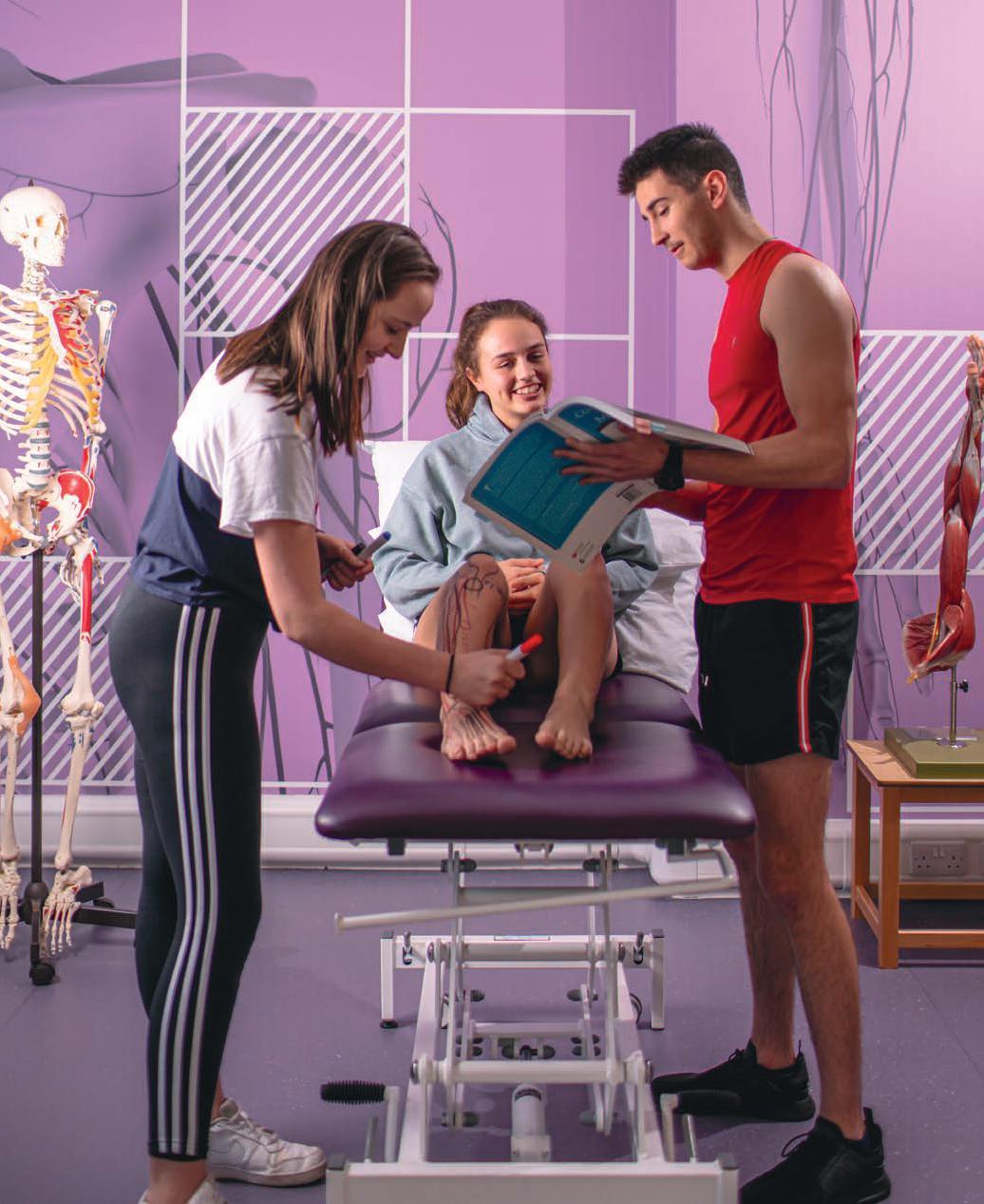AN EARLY ADOPTER OF THE PRINCIPLES FOR RESPONSIBLE MANAGEMENT EDUCATION (PRME)
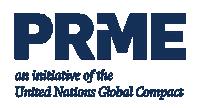

This is our Sharing Information on Progress (SIP) report on the implementation of the Principles for Responsible Management Education 2022


3 PRINCIPLES FOR RESPONSIBLE MANAGEMENT EDUCATION 2022 MESSAGE FROM THE DEAN OF WINCHESTER BUSINESS SCHOOL 4 UNIVERSITY OF WINCHESTER: VALUES, STRATEGY, AND PRME 5 Values, our Core, and our Strategy 6 The University statement on Sustainability 8 PRME AT THE WINCHESTER BUSINESS SCHOOL 11 PRME Chapter – UK & Ireland 12 Who we are and how we implement the PRME and embed SDGs in what we do 13 Collaborative partnerships 15 TEACHING, LEARNING, ENGAGEMENT 21 Formal Curriculum 21 Where does PRME and SDGs sit in our Business School Curriculum 24 Student engagement 25 Informal Curriculum 26 On campus and Community activities 26 Special highlight: Food and Catering on Campus 36 INTREGATED REPORTING 41 How we create value 42 Highlights from our recent report 43 ENVIRONMENTAL STRATEGIES 47 RESEARCH AND PUBLICATIONS 55 Projects and Partnerships 56 PRME Blueprint Inspiration Guide Contribution from us 57 Selected Publications 59 PARTNERSHIPS AND ENGAGEMENT 63 PRME SYMPOSIUM, University of Winchester Business School, July 2023 65 PLANS FOR THE NEXT YEAR 69
Message from Dean of the Faculty of Business and Digital Technologies University of Winchester Business School, Sarah Moore-Williams.

Our Faculty was established over fifteen years ago and from the outset
PRME has played a central role in informing our strategies relating to curriculum design, pedagogy, research and knowledge exchange. The fact that the Principles align so closely to the values and mission of the University ensures that PRME plays a central part of the Faculty vision of creating a more equitable and sustainable economy and society.
It also helps to shape our future in being part of the continuing development of PRME, locally, nationally and globally. We are proud to be a PRME Champion School and we are privileged to work collaboratively with the broader international PRME community.
The six PRME Principles provide the framing for the nature of our engagement in Responsible Management and the 17 Sustainable Development Goals (SDGs) set out the agenda for our work towards 2030.
This PRME Sharing Information on Progress (SIP) report presents in more detail our focus on this agenda. Highlights of our significant achievements include:
1 PRME International Symposium at the University of Winchester in July 2023 offered a strong interdisciplinary and triple-helix programme agenda that brought together purpose-driven speakers from across sectors. It ignited a comprehensive set of discussion and debates on how and where business schools can continue to effectively further the sustainable development agenda, both nationally and internationally, in a changing higher education landscape today. The symposium saw speakers and attendees from PRME Champions and Chapters from both the UK and overseas along with a strong student engagement. This will now be an annual event at the school.
2 PRME international summer school programme on ‘Responsible Leadership and Sustainable Management Practices’ which provide learners with a conceptual and practical understanding of the principles of responsible management as presented in the United Nations PRME, Global Compact frameworks, and SDGs. Emphasis is given to the business perspective (both from an individual and organisational analytical lens), alongside other societal actors in a broader political economic context, and how these inform ethical decisions that shape responsible business management practices.
3 Hosting the Young Person’s Climate Assembly to send a message to local decision makers about climate change and the urgent need for action. Their motto is ‘Participate. Debate. Create’, including goals such as ensuring local energy from a clean, green source in harmony with nature; Efficient and affordable pollution-free transport; Save by buying things that last and can be repaired, reused or recycled. We endeavour to continue this as an annual initiative.
4 Our continued partnership with Advance HE in the annual Integrated Reporting. Some highlights and specific references to cases have been shared in this report on how we create value and where both Faculties and students have made contributions to several SDGs locally, nationally, and also internationally.
We look forward to continuing this work and particularly to helping to realise the interdisciplinary nature of the Sustainable Development Goals (SDGs) while continuing to embed the PRME principles in what we do and who we are.
Sarah Moore-Williams
PRINCIPLES FOR RESPONSIBLE MANAGEMENT EDUCATION 2022 4
UNIVERSITY OF WINCHESTER AND ITS VALUES
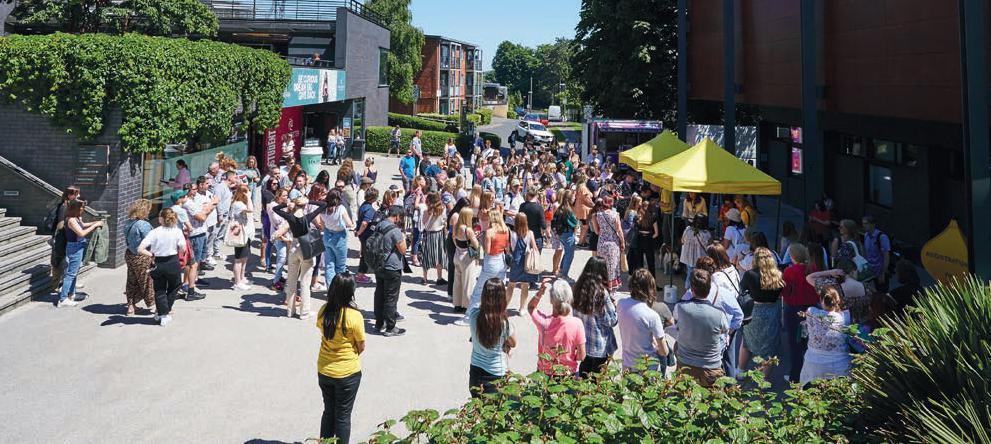
AS A UNIVERSITY, WE HAVE ALWAYS BEEN – AND WILL ALWAYS BE – LED AND DRIVEN BY OUR VALUES. AS THE WORLD AROUND US CHANGES, WE HAVE ACCEPTED THE CHALLENGE TO CHANGE WITH IT AND MOVE FORWARD WITH CONFIDENCE. OUR REIMAGINED VALUES REFLECT OUR PAST AND SPEAK TO OUR FUTURE. IT IS SHAPED BY OUR ORIGINAL MISSION – TO EDUCATE, ADVANCE KNOWLEDGE AND SERVE THE COMMON
GOOD – AND IT IS GUIDED BY OUR REIMAGINED VALUES. IT FOCUSES ON THE IMPORTANCE OF PEOPLE, PLACE AND PARTNERSHIPS IN DELIVERING OUR MISSION.
As a community, we value:
THE LOVE OF LEARNING
As individuals and as a community, we seek to discover new ideas, and understand new perspectives. We pursue both a depth and breadth of knowledge. We celebrate academic excellence and intellectual challenge. We seek to understand the perspectives of others and we welcome respectful debate, listening to views which may differ from our own with interest and defending our own with reason and humanity.
INDIVIDUAL AND SHARED ENDEAVOUR
As individuals and as a community, we seek to bring our best to our work and our study. We commit to striving to be successful, to do things well and play our part. We recognise that excellence only comes with effort and persistence. We are confident and believe in ourselves, collectively and individually. We are a welcoming, professional and respectful community. We see working together in partnership – in our own community and beyond it – as key to expanding our horizons and creating opportunities.
MAKING A DIFFERENCE
From our Church of England foundation in 1840, built upon deeply held principles of creating a better world for everyone through education, we continue to play our part to ensure lasting change in the communities we serve through transformational education, impactful research and enduring partnerships.
We make a difference by educating graduates who will create a better, fairer world with enthusiasm, energy and creativity. We make a difference undertaking and sharing research which will inform and enable lasting change. We make a difference to our world by committing to care for it and live in it sustainably.
We make a difference to each other by behaving with humanity and respect, recognising that we each make a worthy contribution to a community which we value and of which we are all an important part.
PRINCIPLES FOR RESPONSIBLE MANAGEMENT EDUCATION 2022 5
THE CORE: TRANSFORMATIONAL EDUCATION
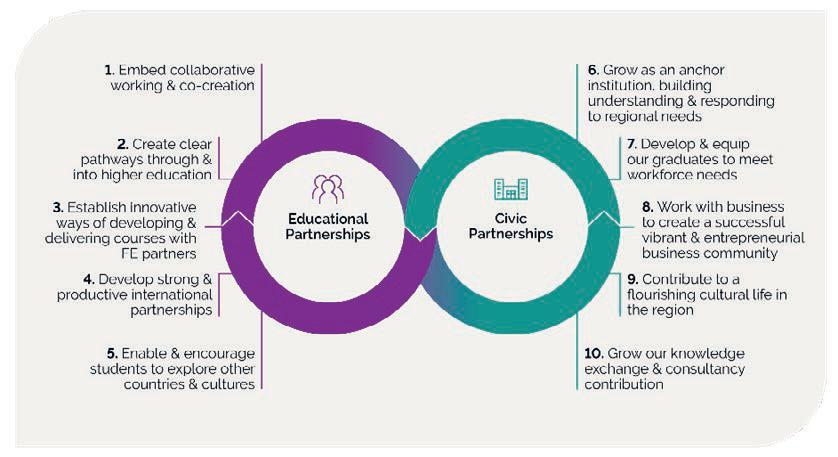

The core focus of this plan is to deliver an exceptional education, environment and experience for our students, instilling in them a love of learning and preparing them for meaningful and successful lives.
“THIS IS SUCH AN EXCITING MOMENT FOR THE UNIVERSITY, AS WE STAND ON THE FIRM FOUNDATIONS OF OUR PAST TO REACH INTO A FUTURE WHICH WILL ALLOW US TO TRANSFORM MORE LIVES THROUGH EDUCATION. THIS STRATEGY ALSO ENABLES US TO TRANSFORM THE WAY WE WORK TOGETHER AND TRANSFORM THE COMMUNITIES WHICH WE SERVE.”
PROFESSOR SARAH GREER, VICE CHANCELLOR
OUR STRATEGY
PRINCIPLES FOR RESPONSIBLE MANAGEMENT EDUCATION 2022 6
DELIVERING THE STRATEGIC PLAN
ME Champions group in 2016 continuing until 2021.
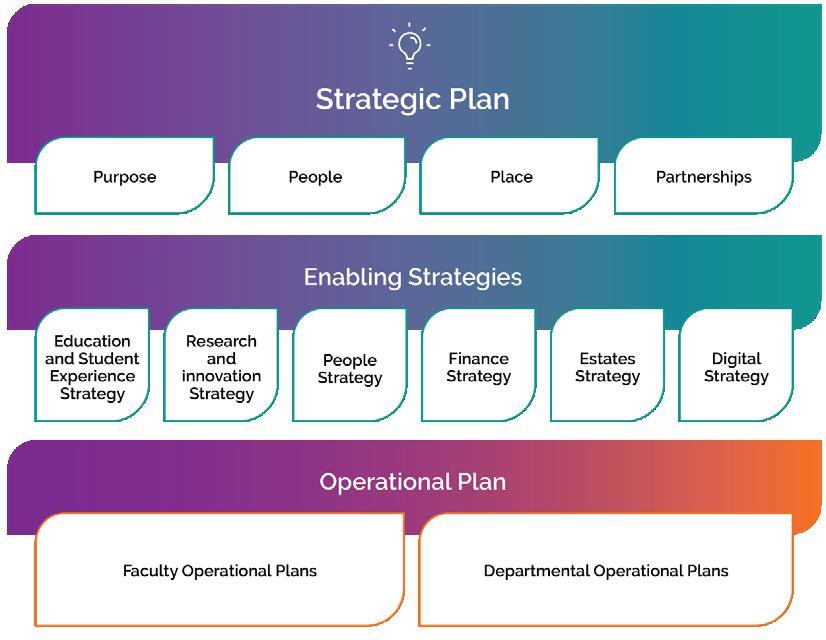
PRINCIPLES FOR RESPONSIBLE MANAGEMENT EDUCATION 2022 7
THE UNIVERSITY STATEMENT ON SUSTAINABILITY
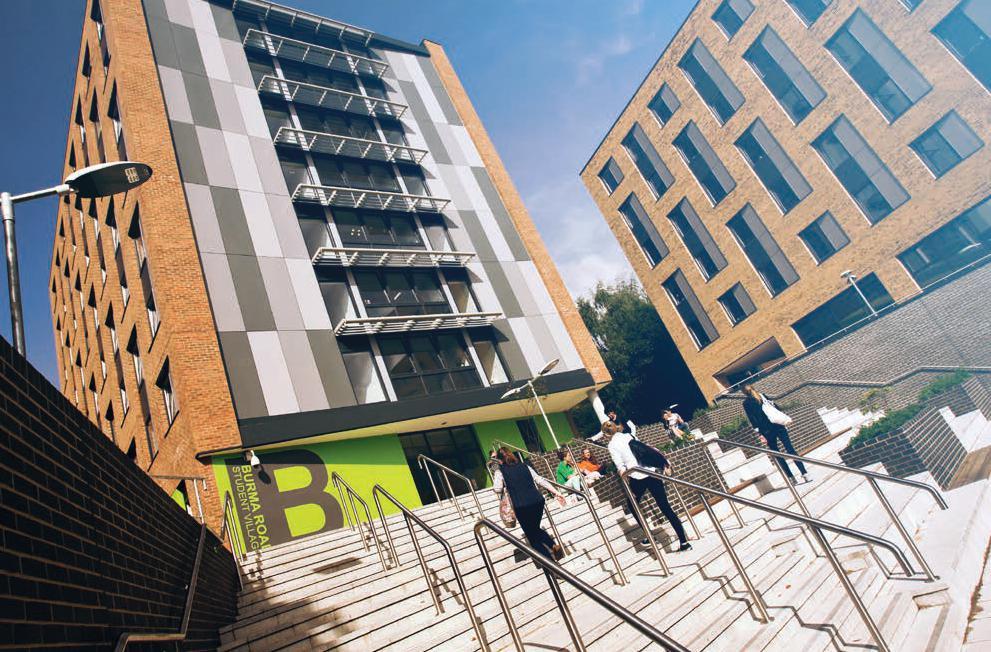
PRINCIPLE 2: VALUES, PRINCIPLE 1: PURPOSE, PRINCIPLE 6: DIALOGUE


We are a community committed to making a difference, passionate about seeing individuals and communities flourish.
To us, sustainability means living in harmony, acting with kindness, and caring for all living things, now and for future generations.
This means we act responsibly, consider the wider implications of our actions, and strive to see our lives having a positive impact on the world.
We equip our graduates with the skills to make a difference in their future careers and enable staff and students to consider their individual and collective environmental and social impacts.
We take the challenges that the world faces seriously. We engage in meaningful and critical dialogue and ensure that social justice is at our core.
SUSTAINABILITY IS A WAY OF LIFE AT WINCHESTER, AND WE INCORPORATE IT IN EVERYTHING WE DO.
We see sustainability as fundamental to our culture and practice and is our ‘business as usual’. We are progressive and pioneering, ahead of our time. Our staff and students are engaged in the importance of sustainability and feel confident to engage with finding solutions to our world’s greatest challenges.
BACKGROUND…
The above statement was developed collaboratively with input from 100 staff, students, and community members. It articulates a shared vision for sustainability and deepens our joint ownership across all parts of the university and student union community.

8 PRINCIPLES FOR RESPONSIBLE MANAGEMENT EDUCATION 2022
This PRME Sharing Information on Progress (SIP) Report presents in more detail our focus on the six PRME Principles as follows;
1 PURPOSE
in relation to developing the capabilities of our students;
2 VALUES how we incorporate values of global social responsibility and sustainability into our academic activities, organisational policies and practices

3 METHOD how we create educational frameworks and materials that enable effective learning experiences for responsible management and leadership


4 RESEARCH

our research agenda includes all aspects of ‘responsible management’, for example: poverty, food, green spaces, climate change education, ethics, responsible leadership, sustainability and social responsibility
PARTNERSHIP

5
we work collaboratively with a wide range of partners in this space. This includes local, national and international organisations in academia, and all sectors within business, government and civil society
6 DIALOGUE we support and facilitate dialogue between different voices on critical issues related to ethics, social responsibility and sustainability

PRINCIPLES FOR RESPONSIBLE MANAGEMENT EDUCATION 2022 9

10 PRINCIPLES FOR RESPONSIBLE MANAGEMENT EDUCATION 2022
PRME AT THE WINCHESTER BUSINESS SCHOOL
Whilst business and management have been part of the University curriculum for over 20 years, the University of Winchester Business School was established around the time of the launch of the UN backed ‘Principles of Responsible Management Education’ initiative, or PRME in 2008. The University is proud to have been an early adopter of the PRME Principles which have played a central role in shaping, from its formation, the Business School’s strategies relating to teaching research and external engagement.
PRME’s vision is to realise the Sustainable Development Goals through responsible management education and its vision is to transform business and management education and develop the responsible leaders of tomorrow. It now includes over 800 business schools worldwide. The fact that the PRME Principles align so closely to the values and mission of the University makes our commitment to PRME such a central part of the vision of the Business School and the wider University. This helps to shape our future in being part of the continuing development of PRME.
The Principles have also influenced and helped shape the University wide strategy and agenda with regard to sustainability. As a University, Winchester has a new 2020-2030 Strategic Vision for the University that specifically supports the achievement of the United Nations’ Sustainable Development Goals (SDGs). This is a bold and distinctive vision to provide worldleading, values-driven higher education: this means everything we do is built upon our deep commitment to our values and aims to make a real difference in the world.
The new strategy focuses all faculties and subject areas around Agenda 2030 and the SDGs. We take an interdisciplinary, whole institution approach to embedding sustainability and social justice into the formal curriculum, the informal curriculum (on campus and community policies, events and activities) and also the subliminal curriculum (organisational policies and practices).
Demonstrating the importance of the business school sector in SDG implementation by:



• Working across the business school sector, professional academic and accreditation bodies, and businesses to showcase ways in which business schools are contributing to the SDGs;
• Undertaking steps to ensure the voices of business schools are heard in local dialogues about National Action Plans and implementation of the SDGs:
• Leveraging business school partnerships and networks to stimulate sector-wide action on the SDGs; and

• Critically evaluating the ways in which SDG National Action Plans are being developed, communicated, implemented and evaluated


PRINCIPLES FOR RESPONSIBLE MANAGEMENT EDUCATION 2022 11
PRME CHAPTER - UK AND IRELAND
Locally, this includes engaging with the PRME Regional Chapter - UK & Ireland, attending the PRME 10th anniversary Conference at Aston University in June 2023, hosting the first international PRME Symposium on 13th and 14th July at the University of Winchester, introducing the very first PRME summer school programme, while also engaging Winchester Business School students to engage with the PRME Responsible Business and Management Student Essay Writing Competition (one of them is a winner).
Following the appointment of Dr Boidurjo Rick Mukhopadhyay in January 2023 as the PRME Champion for the University, there is increased engagement with PRME Global, Chapter Eurasia, ASEAN while

also contributions made to PRME Working Groups, most notably – Climate Change and Environment, Poverty: A Challenge for Management Education, and Sustainability Mindset. The school is also piloting projects for The Impactful Five (i5): Learning in Leadership Education while collaborating with UK and non-UK PRME Chapters and wider networks.
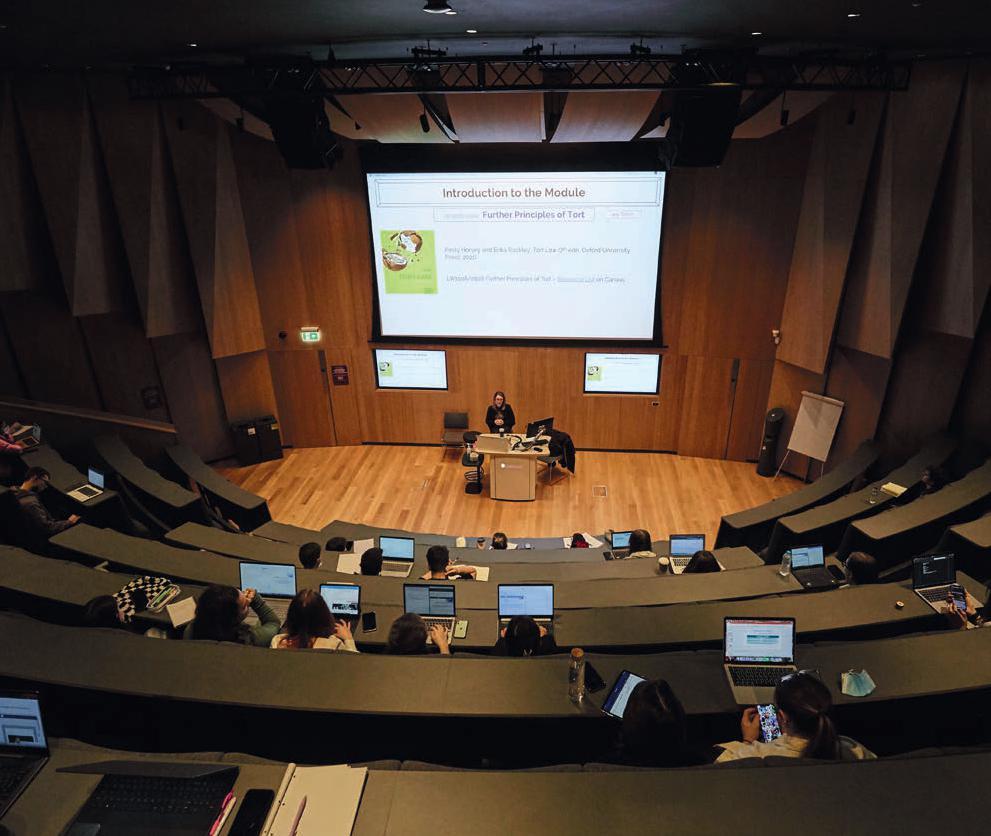
PRINCIPLES FOR RESPONSIBLE MANAGEMENT EDUCATION 2022 12
IMPLEMENTION OF PRME IN OUR CURRICULUM
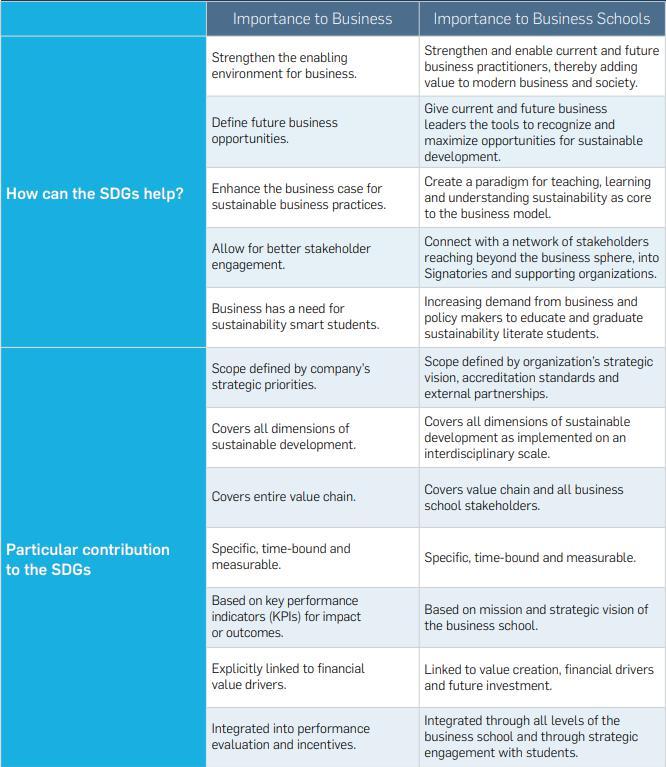
13 PRINCIPLES FOR RESPONSIBLE MANAGEMENT EDUCATION 2022
PRME (2018)
STRATEGIC VISION 2030

University of Winchester has a 10-year vision –Strategic Vision 2030: A beacon of education excellence, sustainability and social justice- that is all about the Sustainable Development Goals (SDGs). Part of this strategy is embedding the SDGs across the University, including and in particular in the classroom in not just the formal curriculum but the informal and subliminal curriculums. This has been supported through a strong commitment from the top, and passion and energy across the student body, staff and faculty.

Courses are led by a diverse and inspired team of educators and researchers whose international experience, backgrounds and rich research skills make for a thorough and rewarding student experience. We are committed to providing a transformative educational experience for all our students.
The University of Winchester Business School offers a full range of undergraduate, postgraduate and doctoral programmes with a growing number of academics and administrative colleagues. PRME is the framing for our programmes and our research agenda embraces many aspects of ‘responsible management’, including poverty, food, green spaces, climate change education, ethics, responsible leadership, sustainability and social responsibility.
We are a community committed to making a difference and passionate about seeing individuals and communities flourish. Winchester has worked closely with the UN Global Compact UK Network and the UK-based Business in the Community. Since 2012, The Hoare Centre for Responsible Management at the Winchester Business School has brought bring together the private, public and civil society sectors, in order to develop a community of practice, dedicated to the creation of a more equitable and sustainable economy and society through the following activities: developing responsible leaders, conducting practical research, building a responsible management community.
2017 saw the launch of the Centre for Climate Change Education and Communication - now the Centre for Climate Change and Action - that builds on the University’s strategy to embed climate change education for all students, regardless of discipline. The fact that the PRME Principles (and the SDGs) align so closely to the values and mission of the University makes our commitment to PRME a central part of the vision of the Business School
We have an excellent track record of education, employability and enrichment in partnership with the business community. Many of our degrees have a period of employment built into the structure of the programme and this is regarded as an integral part of your learning. It’s an opportunity for you to apply your knowledge and skills in an industrial setting while experiencing the atmosphere and pace of the workplace. This will ultimately help you to develop confidence and define your future career goals.
The University of Winchester Business School is a provider of the Help to Grow: Management programme, a UK government initiative to help small and medium sized businesses boost their business performance and growth potential.

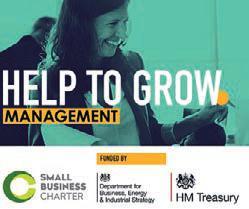

Studying within the University of Winchester Business School encourages positive and critical attitudes towards change and enterprise, reflecting the dynamism of the business environment and societal needs. Our undergraduate and postgraduate courses are an excellent preparation for starting and developing a career in business-related areas and management in the private, public and not-for-profit sectors. They will also develop your lifelong learning skills ensuring the learners are prepared and adaptable for the changing working environment of the future. The education that learners receive ensures the skills that employers require enabling the learners to contribute to the organisation where they will work and to become a successful alumnus of the Business School.

PRINCIPLES FOR RESPONSIBLE MANAGEMENT EDUCATION 2022 14
COLLABORATIVE PARTNERSHIPS
DEGREE APPRENTICES
The degree apprenticeship is a new government and industry scheme allowing young people to complete a full honours degree whilst working. Our innovative Degree Apprenticeships were pioneered by Winchester Business School.
CARKE
The Centre for Apprenticeship Research and Knowledge Exchange (CARKE) at the University of Winchester aims to help accelerate the process by which employers and individuals with high aspirations can benefit mutually from high-quality apprenticeships.
LOCAL ENTERPRISE PARTNERSHIPS (LEPS)


The Enterprise M3 Local Enterprise Partnership is a public/private partnership set up to support and sustain economic growth at a local level. As one of the largest and most successful LEPs in the country, it is firmly established locally and has gained momentum within the business community. The University of Winchester believes it has a significant role to play in supporting the LEP, in up-skilling the local workforce and in contributing to the wider development of the economy.
WORK PLACEMENTS
Our Work Placement Scheme is a partnership between the student, the employer and the University, and has been designed to help undergraduates gain real work experience. It has been developed for future graduate workforce through placement in the following discipline areas:
• Business Management
• Human Resource Management
• Marketing
• Events Management
• Accounting, Finance and Economics


A student work placement is an integral part of our undergraduate programmes in the Winchester Business School. Placements are undertaken following a student’s second year of study. There is the opportunity to host University of Winchester students for 12 months or less, paid or unpaid. We also have regular career fairs on the business school campus at the West Downs Centre where a host of hiring managers across industries and markets join us.
A deep commitment to PRME has a primary goal: to develop “the capabilities of students to be future generators of sustainable value for business and society at large.” [ Principle 1 of PRME]
The above examples under Collaborative Partnerships reinforce the top-down and bottom-up commitment as indicated by the PRME SDGs campus, see figure 1 below.
15 PRINCIPLES FOR RESPONSIBLE MANAGEMENT EDUCATION 2022
Figure 1. Simultaneous top-down and bottom-up commitment
THE PRME SDG COMPASS (UNGC, 2020; GRI, 2020; AND WBCSD 2020)
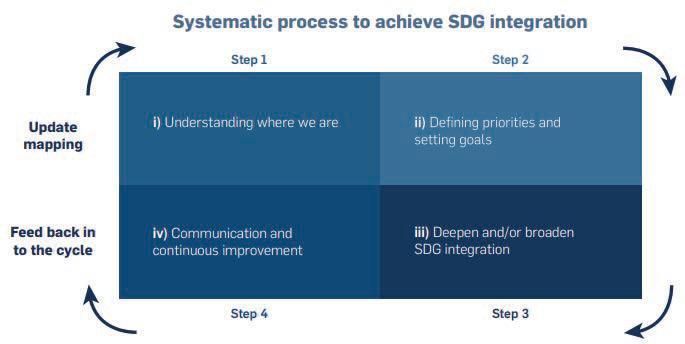
An institution’s pledge to PRME and integration of the SDGs is more likely to be realized if its commitment is laid out in a) The vision statement b) The mission statement c) The institutional values
SDGs depends on three factors: the alignment of organisational and individual academic interests; the alignment of individual academic interests with one or more Global Goals; and academics’ belief that integrating the SDGs into their work will make their own teaching and research even more relevant for their students and corporate clients.
ENGAGING STAKEHOLDERS WITH THE WINCHESTER BUSINESS SCHOOL TO IMPLEMENT PRME
We work with Students Organising for Sustainability (SOS-UK) Responsible Futures Programme. This initiative is part of the National Union of Students here in the United Kingdom and aims to support partnerships between students and institutions aimed at taking a whole-institution approach to embedding sustainability into formal and informal learning. We thought it was very important that this came from a student perspective, so we identified student auditors from amongst our student body to lead this process.
Our organisational strategies, policies and practices convey messages to our stakeholders about our commitment to sustainability and social justice. As a university we hold people, the planet and all living things in the highest regard. Our strategy commits us to reducing our environmental impact and improving sustainability across the institution. We are committed to making a positive environmental impact and contributing to a sustainable future. This is reflected across the institution – from the curriculum to our estate to the food we serve on campus.
16 PRINCIPLES FOR RESPONSIBLE MANAGEMENT EDUCATION 2022
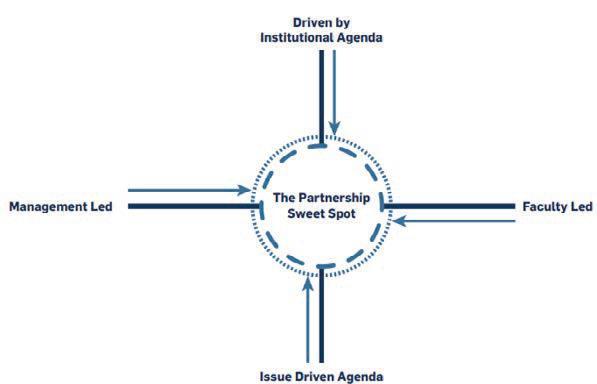
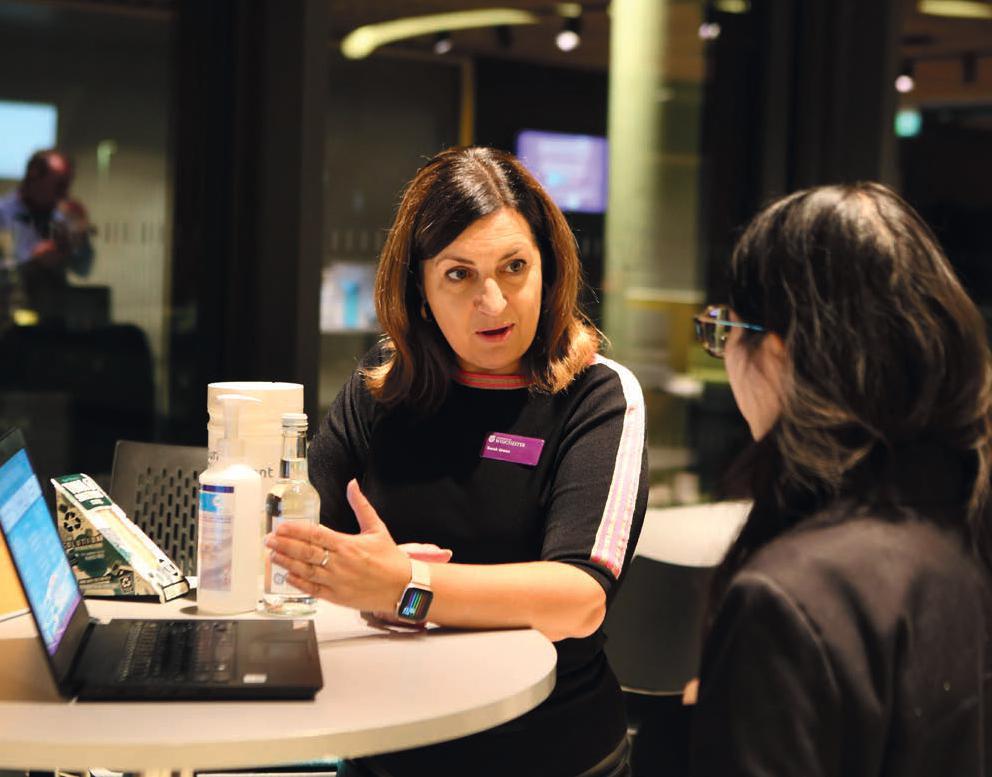
17 PRINCIPLES FOR RESPONSIBLE MANAGEMENT EDUCATION 2022
Figure 2: A dynamic model illustrating the strategic options for integrating SDGs into HEI partnerships ( Ryan and Hauser, 2020)
SIX PRINCIPLES
As institutions of higher education involved in the development of current and future managers, we declare our willingness to progress in the implementation, within our institution, of the following Principles, starting with those that are more relevant to our capacities and mission. We will report on progress to all our stakeholders and exchange effective practices related to these Principles with other academic institutions:
Principle 1 | Purpose: We will develop the capabilities of students to be future generators of sustainable value for business and society at large and to work for an inclusive and sustainable global economy.
Principle 2 | Values: We will incorporate into our academic activities, curricula, and organizational practices the values of global social responsibility as portrayed in international initiatives such as the United Nations Global Compact.


Principle 3 | Method: We will create educational frameworks, materials, processes and environments that enable effective learning experiences for responsible leadership.
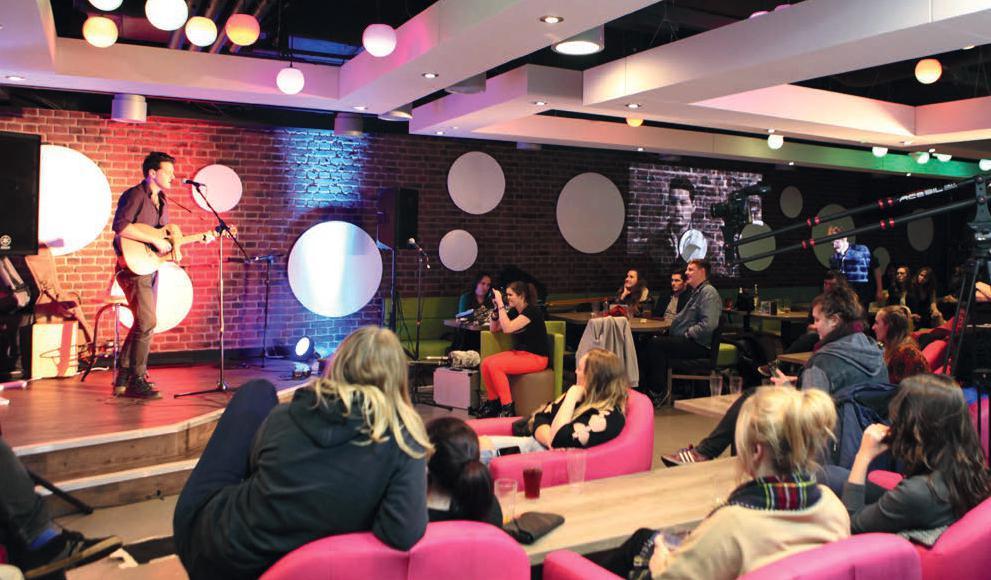
Principle 4 | Research: We will engage in conceptual and empirical research that advances our understanding about the role, dynamics, and impact of corporations in the creation of sustainable social, environmental and economic value.

Principle 5 | Partnership: We will interact with managers of business corporations to extend our knowledge of their challenges in meeting social and environmental responsibilities and to explore jointly effective approaches to meeting these challenges.

Principle 6 | Dialogue: We will facilitate and support dialog and debate among educators, students, business, government, consumers, media, civil society organizations and other interested groups and stakeholders on critical issues related to global social responsibility and sustainability.

We understand that our own organizational practices should serve as example of the values and attitudes we convey to our students.

PRINCIPLES FOR RESPONSIBLE MANAGEMENT EDUCATION 2022 18
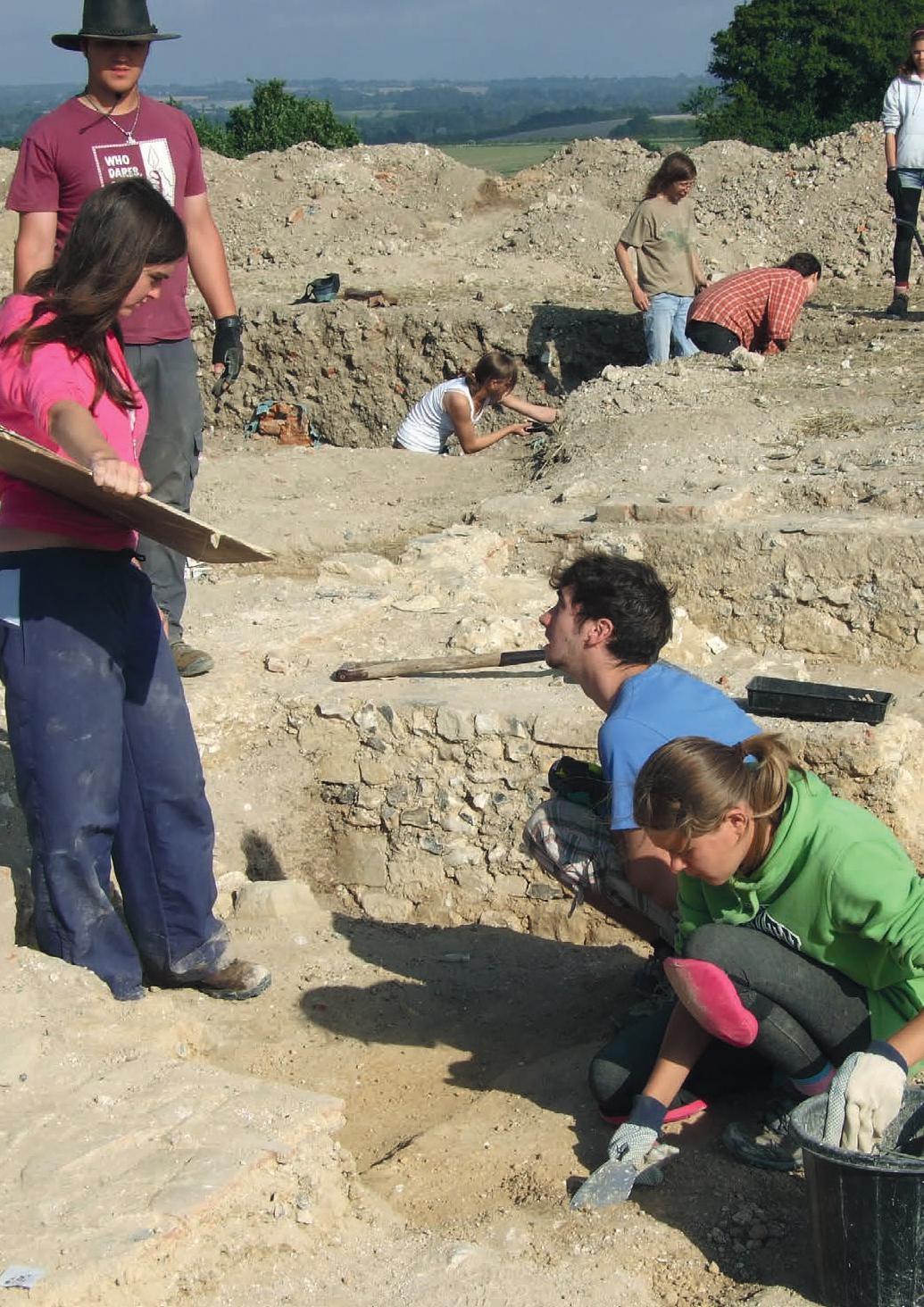
19 PRINCIPLES FOR RESPONSIBLE MANAGEMENT EDUCATION 2022
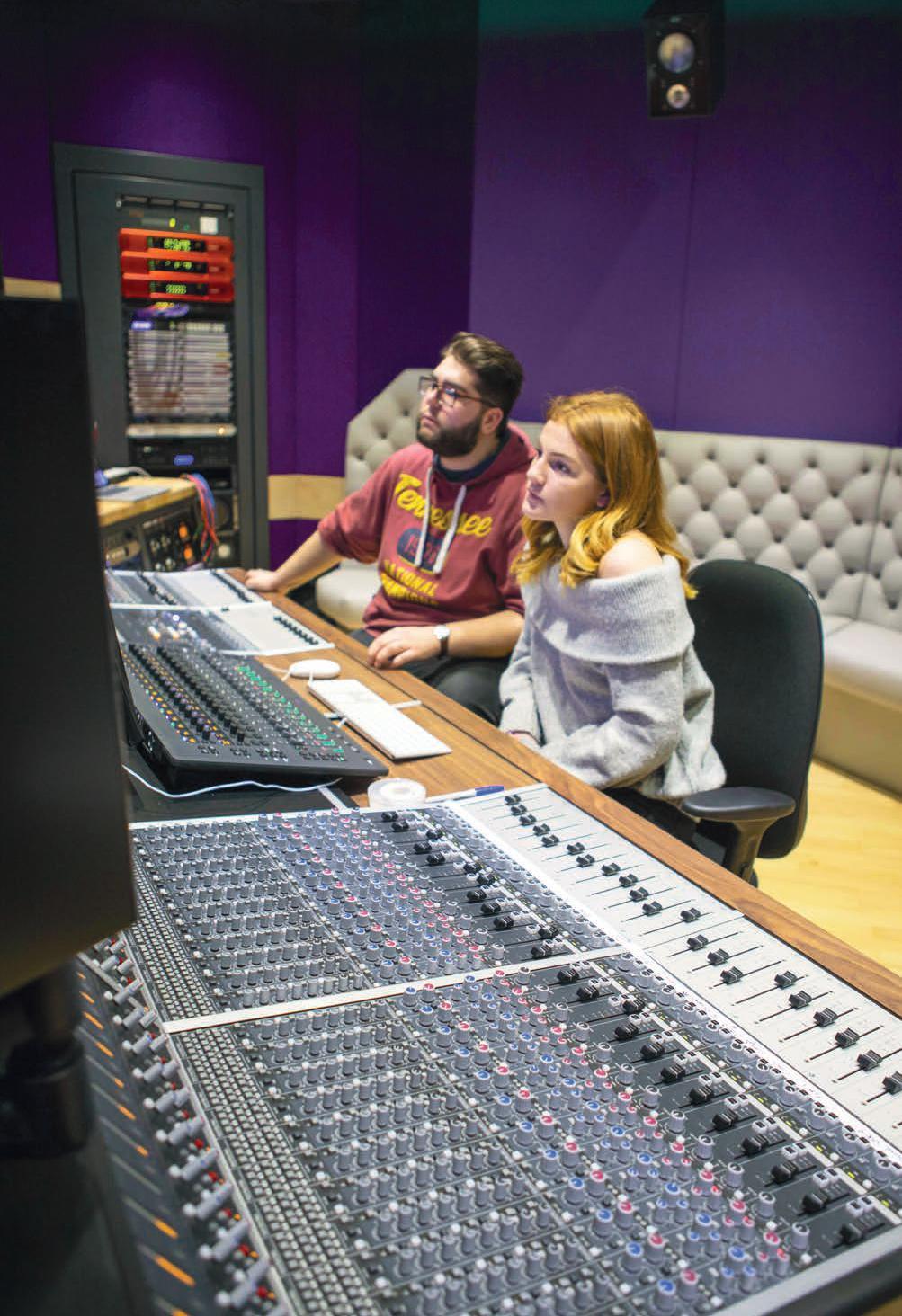
20 PRINCIPLES FOR RESPONSIBLE MANAGEMENT EDUCATION 2022
TEACHING AND LEARNING
WE CONTINUE TO INCORPORATE INTO OUR ACADEMIC ACTIVITIES, CURRICULA, AND ORGANISATIONAL PRACTICES THE VALUES OF GLOBAL SOCIAL RESPONSIBILITY AS PORTRAYED IN INTERNATIONAL INITIATIVES SUCH AS THE UNITED NATIONS GLOBAL COMPACT.
FORMAL CURRICULUM EDUCATION FOR SUSTAINABLE DEVELOPMENT (ESD)

The PRME Principles continue to underpin teaching on our Business Management degrees from first year undergraduates to postgraduate students. This includes core modules relating to Responsible Management and Sustainability as key pillars in the framework for our courses.
An example of an undergraduate module is Sustainability in Business - In the second year, students are required, as part of their module assessment to analyse organisation sustainability approaches and reporting methods using frameworks such as the Gap Frame. and the United Nations Global Compact SDG Compass. Dr Boidurjo Rick Mukhopadhyay also guided more than 15 students on Research Methods for Business Managers, second year module, on topics related to sustainability in fashion, net zero carbon transitions, triple bottom, and climate change mitigation strategies.
In addition, there are first year module on Responsible Management (first year students), Business Ethics (second year students) that come with significant SDG coverage in the curriculum.
POSTGRADUATE PROGRAMMES


The Masters In Business Administration (MBA) and other Masters level programmes such as the Applied Global Practice, International Business and the new Sustainability Masters include core modules on Sustainability, Ethics and Responsibility.
The MSc Sustainability and Social Justice programme also challenge current thinking on the way in which individuals engage with, and organisations operate within an increasingly turbulent global environment. It builds upon the United Nation’s Principles for Responsible Management Education and designed
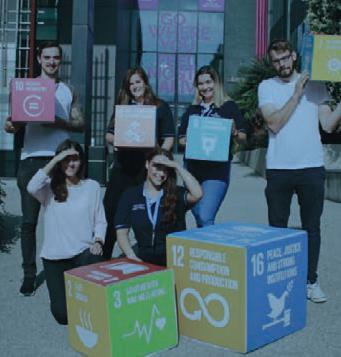
alongside the UN SDGs. Core modules comprise Principles of Responsible Management, Social Justice, Principles of Environmental Sustainability, Climate Change and Policy Responses, International Human Rights and Social (in)Justice.

Other Master’s level programmes such as International Business and Project Management include a core module on the Principles of Responsible Management [PRM] Students engage with the analysis of organisational practices through the lens of ‘The Great Reset’ and ‘Build Back Better’. The Executive Masters in Business Administration (MBA) comprises a module on Leadership, Sustainability and Ethics which enables professional practitioners to reflect on the alignment of organisational leadership with SDGs.
Dr Boidurjo Rick Mukhopadhyay leads the ‘Principles of Responsible Management’ module at level 7 and has successfully led students to participate in wider PRME and SDGs initiatives across the board, both on and off campus, including mentoring students who participated and won at the National Essay Writing Competition hosted by the UK and Ireland Secretariat in AY 22/23. In addition, he has also implemented a i5 pilot project using an action learning methodology in both is level 7 and level 5 modules.
PRINCIPLES FOR RESPONSIBLE MANAGEMENT EDUCATION 2022 21
This table below shows a selection of where ‘responsible management’ modules are included in our undergraduate programmes and whether they are core (C) or optional (O).
PRINCIPLES FOR RESPONSIBLE MANAGEMENT EDUCATION 2022 22
COURSES Responsible Management Sustainability in Business Globalisation and Diversity Sustainable Strategy in Action Business Ethics Marketing Ethics Corporate Governance Business Ethics, and Law Sustainable Economics Responsible Event Management Fashion Supply Chain Management Fashion & Sustainable Development Goals Volunteering Values Based Studies Human Rights Law Equity Law Company & Corporate Governenace Environment Law and Policy BA (Hons) Business Managenement C C C C C O O O O BSc (Hons) Marketing C O O O BA (Hons) Event Management O C O O BA / MACC (Hons) Accounting and Finanace O C O O C O BSc (Hons) Economics O O BA (Hons) Fashion: Marketing C 0 0 LLB Law O O O O BA (Hons) Fashion Business C O O
FACULTY OF BUSINESS LAW AND DIGITAL TECHNOLOGIES PROGRAMMES WITH SDGS
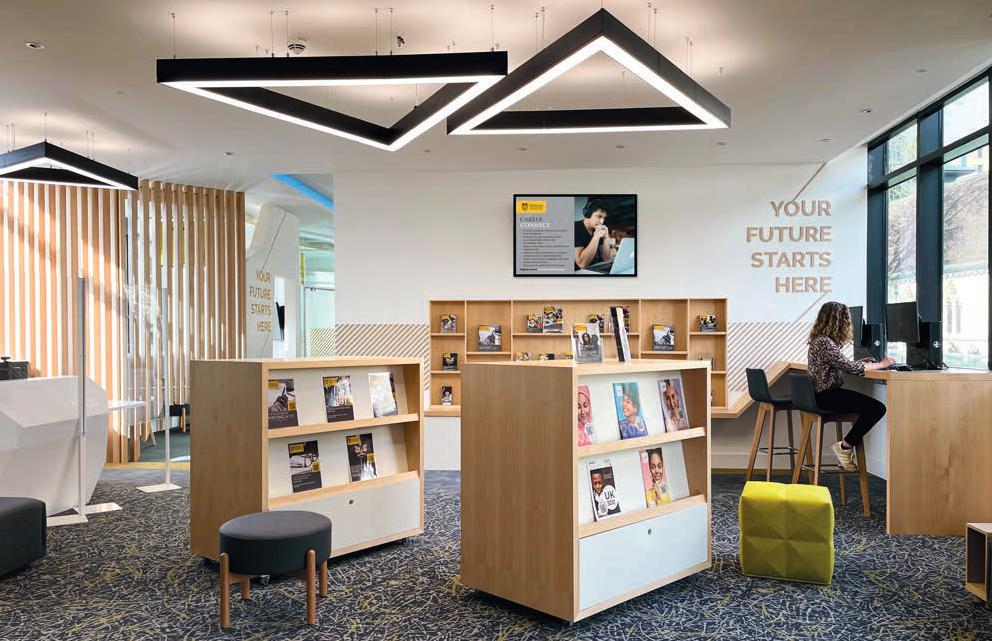
Programmes that include 2 or more SDGs
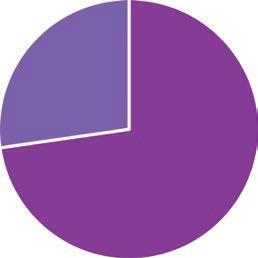
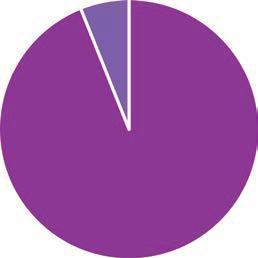
Programmes that include 5 or more SDGs
Students report that the course enables them to return to the workplace inspired to find ways for their teams to contribute to the SDGs.
PRINCIPLES FOR RESPONSIBLE MANAGEMENT EDUCATION 2022 23
2 or more SDGs Under 2 SDGs
2 31 9 24
5 or more SDGs Under 5 SDGs
THE SULITEST (SUSTAINABILITY LITERACY TEST)
The Sulitest - the United Nations endorsed online platform assists in knowledge and understanding of sustainability and has been taken by over 190,000 participants worldwide. Winchester’s participation continues to gain pace with over 500 students and staff having successfully completed it and Sulitest continues to be offered in some courses but is available to all www.sulitest.org



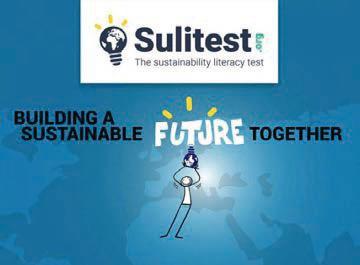
STUDENT DISSERTATIONS

Research analysing the choice of Business School dissertations related to sustainability and social justice over the last 5 years (and determinants for that choice), indicates that the integration of this agenda at Winchester has led to an increase in dissertations in these areas. Comments made in the NSS also indicates a very high level of student interest in sustainability related topics and courses. We also partner with the National Union of Students for the Dissertations for Good initiative.
SOCIAL MOBILITY THROUGH DEGREE APPRENTICESHIPS


TEACHER TRAINING
Winchester teacher training students are to be among the world’s first UN accredited Climate Change teachers, with the opportunity to undertake the Climate Change Teacher course as part of their Education degree. UNICEF Rights Respecting Education underpins all teacher education at Winchester and we offer a wide range of modules focusing on social mobility, including one on forced migration.
DOCTOR OF BUSINESS ADMINISTRATION
The DBA at Winchester is designed to stretch and challenge students in the areas of values and ethics, helping to develop responsible, creative and futurethinking leaders who will make a significant impact in their field (see also Doctoral Research in Publications section). One of our DBA students is actively working on B-Corps - Adrienne Marsden’s research title is “To explore the extent to which the third-party Corporate Responsibility (CR) standard, BCorp, enables businesses to fulfil the ambitions of Regenerative Futures Capitalism. An in-depth study of a certified BCorp.”
The University emerged as one of 27 successful projects to receive a share [ £250,000] of £4.9m funding being awarded by the Higher Education Funding Council for England (HEFCE). Winchester’s Social Mobility Pipeline to Degree Apprenticeships project links employers who are seeking higher skills and a broader pool of applicants with people who are not currently choosing to study on a degree apprenticeship programme. It focuses initially on care leavers; women aspiring to enter traditionally maledominated occupations and leadership roles; women entrepreneurs, and under-achieving males from white British low socio-economic groups.
We have grown our Degree Apprenticeship provision 4-fold over the first 3 years of running the programme at the University of Winchester resulting in increased number of students and including those from more diverse backgrounds.
Our Degree Apprenticeships remain a vehicle for Social Mobility and the University’s Centre for Apprenticeship Research and Knowledge Exchange aims to share knowledge and experience locally and nationally in aspects related to ways in which degree apprenticeships support upward social mobility.
PRINCIPLES FOR RESPONSIBLE MANAGEMENT EDUCATION 2022 24
The University’s new Centre for Apprenticeship Research and Knowledge Exchange aims to be a centre for excellence in understanding and sharing knowledge and experience nationally about improving social mobility into degree apprenticeships. with continuing research being undertaken by Stella McKnight, Director of Employer Partnerships.
WOMEN IN DIGITAL ENTERPRISE

The University of Winchester continues to offer its Women in Digital Enterprise programme targeted at women entrepreneurs based on social mobility and the concept of inclusive growth. Through a series of virtual workshops and online mentoring support, women entrepreneurs are introduced to new ways of thinking about business growth within the context of the current economic climate.
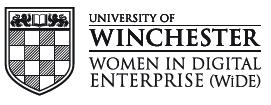
Through a series of workshops and online support, the project has supported 100 women-led businesses in setting up and growing their businesses. The delegates were introduced to new ways of thinking about business growth and opportunities for collaboration.
SUMMER SCHOOL PROGRAMME ON ‘RESPONSIBLE LEADERSHIP AND SUSTAINABLE MANAGEMENT PRACTICES’










Organisations are under increasing pressure from various stakeholders to embed environmental and social purpose into business systems and structures, this programme is designed to develop understanding of opportunities and challenges for progressive and transformative organisational action for responsible leaders of tomorrow.
This first summer school programme at the Business school, developed by Dr Boidurjo Rick Mukhopadhyay at the University of Winchester, provides students with a conceptual and practical understanding of the principles of responsible management as presented in the United Nations PRME, Global Compact frameworks, and also the SDGs. A particular emphasis is given on the ‘responsible business’ perspectives, using an individual and organisational lens, while encompassing wider stakeholders in a global civil society context, This leads to an understanding of the paradoxes and tensions behind ethical decisions that shape responsible management practices today.

PRINCIPLES FOR RESPONSIBLE MANAGEMENT EDUCATION 2022 25
SHORT COURSES ON CARBON LITERACY
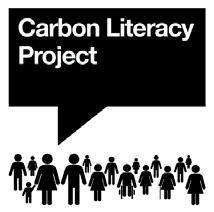



The business school continues its partnership with the Carbon Literacy Project (CLP) and offers Carbon Literacy short online courses. These aim to enable academics, students and others to become Carbon Literate within a short
time frame and to get as many people as possible actively involved in embedding climate solutions in their own life and work. This includes equipping all students with the information and skills needed to make high impact changes in day-to-day behaviours to reduce carbon emissions. The course has already been undertaken by cohorts of academics, students and professional staff at all levels (including Senior Managers and the Vice Chancellor) in the previous years and plans for 2023-24 ensures continuity of the same. Sarah Davies, Head of Education at CLP also delivered a session at the University PRME Symposium in July 2023 hosted by Dr Boidurjo Rick Mukhopadhyay at the Business School.

STUDENT ENGAGEMENT WITH PRME AND SDGS

CASE 1. SUSTAINABLE CLOTHING SALE –‘HELPING THE PLANET, ONE T-SHIRT AT A TIME’
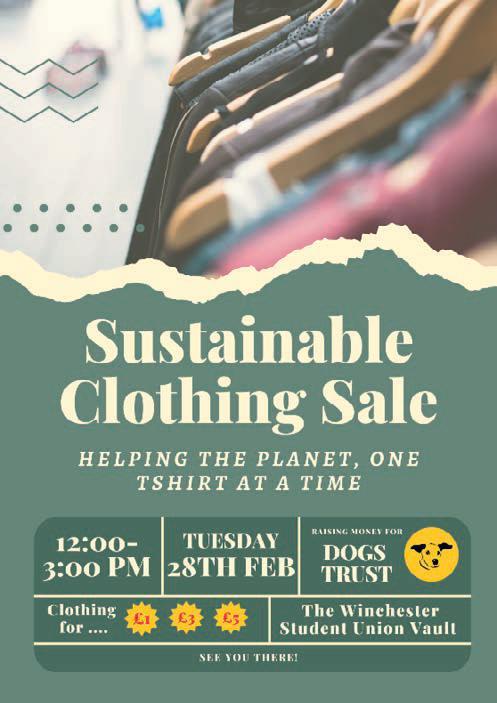
On the 28th February 2023, three final year Event Management students ran a Sustainable Clothing Sale event at Winchester University’s student union. Millie Brown who led the group said, “In the run up to the event, we collected hundreds of second-hand clothing donations from friends, family and the local residents from Hampshire and Surrey to re-sell at the event. This event was run in coordination with Winchester BID and aimed to draw a light on how students can reduce their fast-fashion footprint. Clothes were affordably priced between £1-£5 to fit the student budget, and all money raised was donated to The Dogs Trust charity. Overall, there was a wonderful turn out and we raised £700 in total. For the clothes that we didn’t sell, we bagged them up and donated to local charity shops to continue the sustainable initiative.”

PRINCIPLES FOR RESPONSIBLE MANAGEMENT EDUCATION 2022 26
CASE 2. STUDENT ESSAY ON FAIR TRADE WINS PRME ESSAY COMPETITION

Ms Julia Fricke came second at the PRME Chapter UK and Ireland Responsible Business and Management Writing Seventh Annual Competition 2022/23 for her work titled “Fair Trade or Equal Trade? What are the barriers to equality and fairness as imagined by the Fairtrade Foundation?”


INFORMAL CURRICULUM

ON CAMPUS AND COMMUNITY ACTIVITIES
PUBLIC SECTOR DECARBONISATION SCHEME (PSDS)

The University of Winchester is set to become one of the lowest carbon emitting universities in the UK, following the award of a £3.1m grant from the Public Sector Decarbonisation Scheme (PSDS) in 2022. The grant signals the start of a major capital investment programme by the University in innovative low carbon plant and equipment. The grant underlines the significant progress the University has made since 2006 when we began to move away from fossil fuels and invest in energy efficiency measures, installed renewables, switched to electric vehicles and purchased renewable electricity and gas.



The University aims to be carbon net zero by 2025 – an ambitious target, given many companies are aiming for 2030 and the Government’s goal is 2050. Not taking into account purchasing renewable energy, the University has reduced its carbon footprint by 65% relative to the size of the estate to date. The new low carbon plant and equipment will save a total of 2,702,353 kWh a year.
The targets include:
• The removal of gas boilers/replacement heat pumps - 2,010,629 kWh saved a year, the equivalent to 23,380 tree seedlings grown for 10 years or 300 cars taken off the road

• Solar photovoltaic (PV) panels - 136,156 kWh saved a year, equivalent to 240,000 miles driven by an average vehicle or 12,275,000 smartphones charged
• Building Management Systems optimised in 25 buildings - 471,543 kWh saved a year, equivalent to 56 homes’ electrical use per year or burning 124,000 litres of diesel
• Replacement of non-LED lights to full LED - 84,025 kWh saved a year, equivalent to 13 cars driven for one year or 2,450 propane cylinders burned.
PRINCIPLES FOR RESPONSIBLE MANAGEMENT EDUCATION 2022 27
COP26
The University buys 100 per cent renewable electricity, 100 per cent green gas and has switched 47 per cent of its fleet vehicles to electric. All new buildings, such as the flagship West Downs Centre (where the Business School is based), meet stringent environmental criteria and are ethically financed.
The University of Winchester joined the COP26 Universities Network to help deliver the United Nations’ Climate Change Conference (COP26) and support its mission of a low-carbon, resilient world. The Network is a group of UK-based universities and research institutions, that worked together to raise the ambition for tangible outcomes from the United Nations’ COP26 Climate Change Conference in Glasgow. The Network also helped create lasting partnerships and legacies that reach beyond the Conference. The University collaborated with The Big Green Week Charity to fund Winchester students’ attendance and participation in COP26.
YOUNG PERSON’S CLIMATE ASSEMBLY
The University of Winchester hosted District’s first-ever Young Person’s Climate Assembly to send a message to local decision makers about climate change and the urgent need for action. The one-day event was used as a springboard to give young people a platform to discuss and debate a vision for a fair transition to a zero-carbon future for Winchester. In addition, discussions on strategies what might be done locally to tackle the causes of climate change was also held.
The Winchester District Climate Assembly in October 2022 brought together a range of local formal and informal stakeholders to have an inclusive dialogue using deliberative democracy. The Steering Group is now working on taking the ‘Wins for the Climate’ Summary Report to Winchester City Council.
The motto was ‘Participate. Debate. Create’ with the following goals:
• Local energy from a clean, green source in harmony with nature.
• Efficient and affordable pollution-free transport.
• Save by buying things that last and can be repaired, reused or recycled.
The Mayor of Winchester District Cllr Vivian Achwal said: “The future of our young people is the focus of my mayoral year. Nothing is more important to them
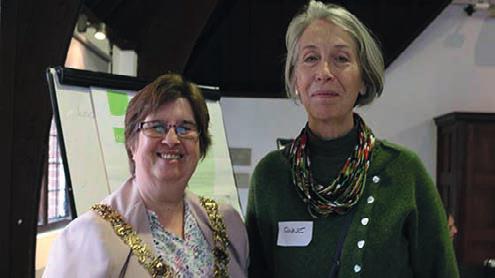
than tackling the climate crisis to secure a sustainable future for them. I hope this assembly is the first of many more to engage directly with young people and understand how they want to build a resilient future.”
GOLD ECO CHURCH AWARD
The Chapel at the University of Winchester won a Gold Eco Church Award for its work in sustainability. It is the first gold award for a University chapel from the project, which is run by Christian environmental charity A Rocha UK.
NATIONAL UNION OF STUDENTS (NUS) RESPONSIBLE FUTURES ACCREDITATION
The University of Winchester and Winchester Student Union were awarded the National Union of Students (NUS) Responsible Futures accreditation for the second time. The accreditation reflects our shared commitment to embedding sustainability and social responsibility in teaching and other activities and recognises the partnership between the University and Winchester Student Union to promote education for sustainable development, to equip students with the knowledge, skills and values to challenge the world around them and tackle social, economic and environmental issues.
The audit report highlighted areas of strength, including developing partnerships and relationships with key stakeholders; proactively engaging with the United Nations’ Sustainable Development Goals, and making sufficient resources available to students and staff. It also identified areas for improvement to continue developing as a sustainable institution.
PRINCIPLES FOR RESPONSIBLE MANAGEMENT EDUCATION 2022 28
Mayor of Winchester Cllr Vivian Achwal and Cllr Anne Weir
Responsible Futures offers a framework and certification of a whole institution’s commitment to sustainability and social responsibility. The accreditation followed an audit led by students trained by the NUS.
Professor Sarah Greer, Vice-Chancellor of the University of Winchester, said: “Shaping education is fundamental to shaping society and, in partnership with Winchester Student Union, we are committed to fostering an environment where education for sustainability and social justice forms part of every Winchester student’s experience while they are studying here. Gaining reaccreditation for Responsible Futures highlights our strong partnership with the Student Union in ensuring sustainability is embedded across the institution.”
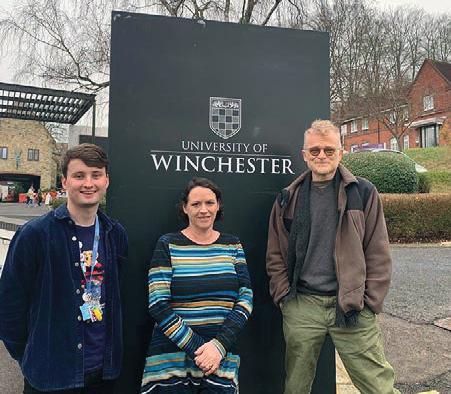
PEOPLE & PLANET’S UNIVERSITY LEAGUE
The University of Winchester is only one of 27 institutions to have been named a First-Class University in the People & Planet’s University League. This is the only comprehensive and independent league table of UK universities ranked by environmental and ethical performance. It is compiled annually by the UK’s largest student campaigning network, People & Planet.
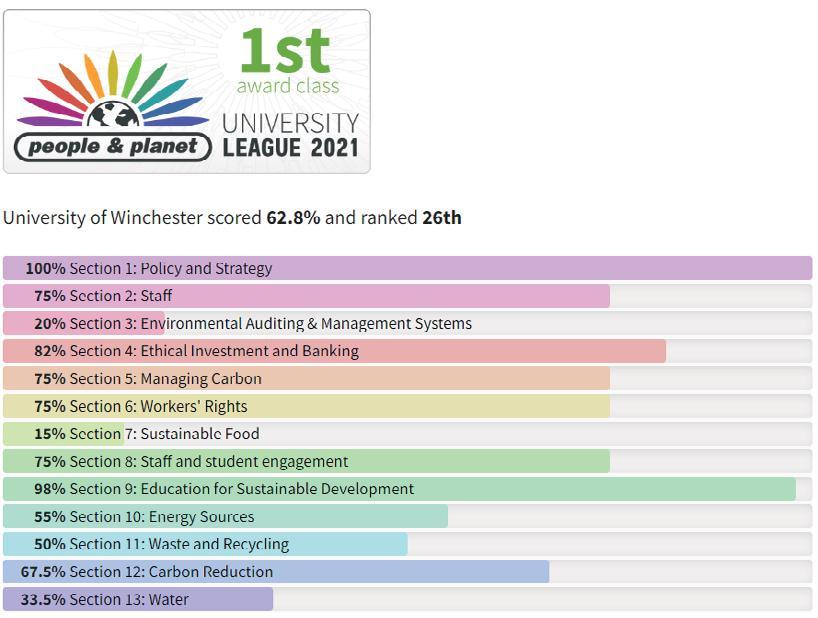
PRINCIPLES FOR RESPONSIBLE MANAGEMENT EDUCATION 2022 29
BIODIVERSITY ACTION PLAN




The University’s Biodiversity Action Plan (BAP) sets out the University’s plans to create and enhance habitats and support wildlife across our campuses. Since 2013 the University has not sent any waste to landfill instead waste which cannot be recycled is sent for energy recovery. We implemented our first BAP in 2012 in partnership with Hampshire and Isle of Wight Wildlife Trust.
Projects completed included the creation of a wildlife pond, a butterfly garden, the allotments, wildflower planting and native hedgerow planting. The BAP was updated in 2016, after which followed a suite of surveys of King Alfred and West Downs quarters, and then again in 2021. This revision reflects the increasing hedgehog population on campus, following dedicated efforts by our students reflected in our Hedgehog Friendly Gold status. The University was the finalist at the Green Gown Awards 2020.
We are hoping to submit for a Green Flag Award for the University grounds at King Alfred Campus in 2023.
SURFERS AGAINST SEWAGE PLASTIC FREE UNIVERSITY ACCREDITATION
In July 2022 the University of Winchester were awarded Plastic Free University Status by Surfers Against Sewage. This award of ‘Plastic Free Communities’ Status highlights the work and commitment as an institution we have made to tackling single-use plastics (SUPs). It by no means signals we are plastic-free, and we do not claim to be, but we are clear that we view SUP as a problem and have made a commitment to do what we can to remove them from our operations.
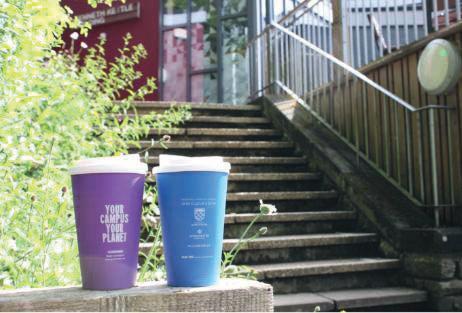
The award shows we are tackling the problem at the source and engaging our community to think about our impact. But it also recognises that this is only the beginning. As part of the award, we have been moved into the next phase of the scheme which is ‘Continuing the Journey’ where we can build on the momentum both within the University but also in the wider community.
Surfers Against Sewage is a grassroots movement that has grown into one of the UK’s most active and successful environmental charities. Born out of the surf community as a response to the dreadful state of UK beaches, the campaign grew strong across the country. The charity continues to monitor sewage spills in real time on beaches around the UK. But “plastic is the new sewage” as it is now the biggest threat to our beaches, marine eco-systems, and our wellbeing. The charity has adopted a two-pronged approach to this problem. First, stopping the problem at source by tackling society’s throwaway culture when it comes to single-use plastics, and second, cleaning up pollution from our beaches and waterways.
BAG IT UP 2022
More than a tonne of clothing, bedding, kitchen and homewares, and store cupboard essentials was donated by University of Winchester students to help people in need in the city, as part of the University’s annual Bag It Up campaign. Items no longer needed by students heading home for the summer were given a second life, benefitting charities including Winchester Basics Bank, The Winchester Beacon, Trinity Winchester, Hampshire Paws and Emmaus.
Students living in on-site accommodation collected over 175 bags of donated items, generating nearly 750kg of clothing and footwear, 150kg of kitchenware, and nearly 120kg of unopened, non-perishable food items. Duvets, pillows, and cushions were donated to animal rescue charity Hampshire Paws.
PRINCIPLES FOR RESPONSIBLE MANAGEMENT EDUCATION 2022 30
INTERNATIONAL ENGAGEMENT
Students and researchers from the University of Winchester took part in a virtual cultural exchange programme with Amity University in New Delhi, northern India. Around 30 undergraduate students from each institution studying on business management courses became partners in the project, which aimed to enhance understanding of the ongoing challenges and issues around the United Nations Sustainable Development Goals (SDGs) each country faces.
The University’s ground-breaking work in sustainability and social responsibility in education placed the institution second in the UK for Sustainable Development Goal 4, Quality Education, in the global University Impact Rankings 2021 compiled by Times Higher Education (THE). The rankings recognise universities worldwide for their social and economic impact on society, based on their success in delivering the United Nations’ Sustainable Development Goals
ZERO CARBON ENERGY PROCUREMENT
Between August 2008 and March 2022 the University bought 100% renewable energy, backed by Renewable Energy Guarantees of Origin (REGOs) from wind, solar and/or hydro. In April 2022 the University had to switch the procurement of its electricity supply to a zero carbon for business tariff, backed by 100% nuclear generator declarations and zero carbon emissions. This move away from renewable was due to the high national demand of 100% renewable energy and limited supply of REGOs to cover this demand. In 2019/20 the University also bought 47% of its annual gas demand from renewable gas generation (biomethane). In the 2020/21 & 2021/22 reporting years the University increased its annual purchasing of renewable gas to 100%.
GREEN GAS PROCUREMENT
In 2019-20, the University took a decision to buy biogas, or ‘green gas’, which is methane generated from anaerobic food digestion. Initially 47% of total supply purchased was green gas increasing to 100% in 2020-21 and subsequent years. This replaces grid gas generated from fossil fuels. From 2021-22, gas purchased is generated at the same anaerobic digestion plant that the University disposes of its own food waste at.
ENERGY EMISSIONS – MARKET BASED REPORTING
Market-based emissions per m2 of estate have reduced by 99% in 2021/22 when compared to the 2006/07 baseline year but have increased 112% when compared to the previous year (2020/21). This significant reduction in emissions from baseline is due to the University buying 100% renewable electricity since 2008/09 and as of the 2020/21 academic year buying 100% of annual gas consumption through a renewable tariff. The increase in market-based emissions in 2021/22 compared to the previous year (20.47 tonnes Co2e increasing to 43.49 tonnes CO2e ) is due to f-gas losses from catering equipment. This equipment has largely been replaced and plans are in place for remaining equipment to be upgraded in the 2022/23 academic year.
Absolute market-based emissions have reduced by 99% in 2021/22 when compared to the baseline year and increased by 112% when compared to the previous academic year (2020/21). Again, this reduction was due to switching to 100% green gas and zero carbon electricity and f-gas losses.
INTERNATIONAL WOMEN’S DAY 2023

On 8th March, 2023, the University brought together women entrepreneurs from the community to share their business journey, challenges, strategies, and wins that they have enjoyed whilst embracing equity. The event focused on equitable practices for women entering the business space.
On 8th March, 2022 - we celebrated the social, economic, cultural and political achievements of women while hosting a Flash fiction and poetry competition on the theme of ‘Woman’.
Madeleine Vaughan, Lecturer in Creative Writing and a member of the judging panel, said: “We had a difficult time selecting winners for each category, as the standard of the submissions was very high. Ultimately, we were looking at dextrous use of language and style, unique interpretations of the theme, and emotive and evocative writing.”
PRINCIPLES FOR RESPONSIBLE MANAGEMENT EDUCATION 2022 31
CAMPUS BLACKOUT
The University’s annual Campus Blackout sees teams of staff and student volunteers switch off computer monitors, lights, printers and other small power in offices and teaching rooms across King Alfred and West Downs quarters on a Friday night. This allows us to demonstrate the positive impact our collective actions can have on the University’s carbon footprint and energy bills. The last Campus Blackout event saw more than 20 students and staff get together and their switching off actions achieved a 11% reduction in energy use overall in the buildings selected.
More than 20 students and staff joined a campus Blackout event on 25 January. Since the first Blackout event since 2019 (due to the pandemic) this major exercise across King Alfred and West Downs Quarters highlighted the positive impact that small, collective switch-off actions can have on the University’s carbon footprint.
Teams of student volunteers, led by staff from the Estates and Facilities department, walked around the University and switch off non-essential small power equipment left on that evening in office areas and teaching rooms - including lights, computer monitors, non-networked printers, mobile phone chargers, and PC speakers.
Now, the Estates team is comparing energy usage during the Blackout evening with energy use on a comparable evening to demonstrate the real savings that can be achieved with just a few small changes to the way we work.
MY GREEN LAB CERTIFICATION
All labs at the university are working towards My Green Lab Certification. This certification is considered the gold standard for laboratory sustainability best practices around the world.
SOLAR PHOTOVOLTAIC
The University has gradually increased the amount of electricity generated onsite since its first solar photovoltaic installation in late 2011. While the amount of energy generated has stayed the same until the new solar installation in the West Downs Centre in 2021, the quantity of emissions avoided is reducing year on year. This is because the carbon associated with grid electricity is reducing as the amount of renewable energy generated in the UK increases and therefore less carbon is saved from renewable generation. However, there are further benefits to producing energy onsite such as reducing reliance on the grid and improving energy security as well as avoiding operational cost.
Under the £3.1 mil Public Sector Decarbonisation Grant that the University, which was awarded in February 2021, a further 151Kw of solar photovoltaic panels solar was installed on a further four buildings. This has increased the University’s generation capacity by 105% in 2021/22 compared to the previous year.
HEDGEHOG-FRIENDLY CAMPUS GOLD AWARD
The University of Winchester was recognised for its hedgehog-friendly campus with a prestigious Gold Hedgehog Friendly award from the British Hedgehog Preservation Society (BHPS). The Gold award comes after three years’ work which began in 2019 and has seen students and staff create hedgehog friendly habitats, set up feeding stations and help to survey hedgehog activity on campus.
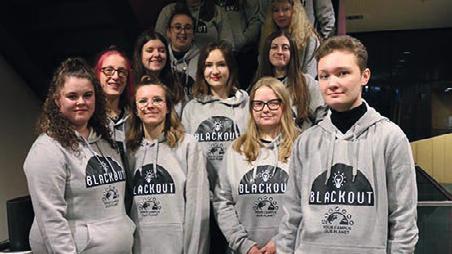
The many initiatives undertaken as part of creating a hedgehog-friendly environment included a collaboration between the University and neighbouring Royal Hampshire County Hospital (RHCH) to make Burma Road - which bisects the University’s main campus and the RHCH site - the first in Winchester to install road signs asking drivers to slow down in case there are hedgehogs crossing.
The University of Winchester is one of 13 universities across the UK to achieve Gold status in 2022. The accreditation follows the team’s successful Bronze accreditation in the 2019/20 academic year and a Silver in 2021.
PRINCIPLES FOR RESPONSIBLE MANAGEMENT EDUCATION 2022 32
FAIR TRADE CONTRACTS
Winchester has a strong reputation of supporting many Fairtrade initiatives, particularly in catering and hospitality. We have been able to tap into many TUCO contracts which have delivered a host of products to staff and students. We have also set out to establish these initiatives in other areas, such as clothing. It is our aspiration to use environmentally and sustainably resourced clothing wherever possible, whether they are Fairtrade, WRAP or Fit for Purpose products. We are committed to the principles of sustainable development, environmental management and protection of biodiversity.
MODERN SLAVERY
Our Modern Slavery Statement is designed to satisfy the requirements of Part 6, Section 54, of the Modern Slavery Act 2015. Winchester’s Financial Regulations, Procurement Policy and Procedures and Ethical Investment Policy state our commitments to the highest standards of ethical conduct in all activities, along with making continuous improvements in this area.
We do not engage in, or condone, the practices of human trafficking, slavery or forced labour. We are committed to improving our business practices to combat modern slavery and human trafficking and to ensure that we are not complicit in any human rights violations. We are committed to zero tolerance of slavery and human trafficking or child labour practices.
We mitigate the risk of modern slavery occurring in our workforce by ensuring that directly employed staff are recruited by following robust HR recruitment policies and checks. There is a whistle-blowing policy in place for members of staff to raise any concerns about wrongdoing by Winchester. Staff employed on a temporary staff basis via agencies are only recruited through established sources who can provide assurance that they comply fully with the requirements of legislation relating to the rights and welfare of their candidates and employees.
Our Ethical Investment Policy has been developed to reflect Winchester’s commitment to ensuring that our investments are not complicit in any human rights violations. To this extent Winchester does not knowingly invest directly or indirectly in organisations that breach human or animal rights, or that are in breach of the Modern Slavery Act 2015.
Our Modern Slavery Statement is published on our website and reviewed on an annual basis. It can be found at: www.winchester.ac.uk/media/contentassets/ documents/Modern-Slavery-and-HumanTraffickingStatement-2022.pdf
FOOD WASTE COLLECTIONS
In late 2021 we introduced food waste collections to all our halls of residence which saw the expansion of collections to our entire campus. On average this diverted 30 tonnes of food waste going to general waste. Instead, this waste is sent off for Anaerobic digestion (AD). This is a natural process in which microorganisms break down the organic matter found in wet biomass waste (such as sewage sludge, animal manure and slurry and waste food) in the absence of oxygen, to produce biogas (mainly a mixture of around 60% methane and 40% carbon dioxide) and digestate (a nitrogen rich fertiliser).
The biogas can be burned directly in a gas boiler to produce heat or burnt in a combined heat and power (CHP) unit to produce heat and electricity. Alternatively, the biogas can be cleaned to remove the carbon dioxide and other substances, to produce biomethane. This can be injected into the national gas grid to be used in the same way as natural gas or used as a vehicle fuel.
PLASTIC FREE UNIVERSITY STATUS
We are delighted to announce that in July 2022 we were officially awarded our Plastic Free University status from national charity Surfers Against Sewage (SAS). This award of ‘Plastic Free Communities’ Status highlights the work and commitment as an institution we have made to tackling single-use plastics. It by no means signals we are plastic-free, and we do not claim to be, but we are clear that we view SUP as a problem and have made a commitment to do what we can feasibly to remove them from our operations.

PRINCIPLES FOR RESPONSIBLE MANAGEMENT EDUCATION 2022 33
COMMUNITY ENGAGEMENT PROJECTS
• Litter picks – we have run several litter picks over the last few years providing opportunities for students and staff to give back to the environment and local community. We have collected over 50kg of litter from the green spaces that surround the University. These picks aim to raise awareness of littering, and how waste and pollution have harmful effects on our local ecosystems.
• Hedgerow planting – the University has helped to provide CPRE Hampshire with volunteers to help restore hedgerow habitat around Hampshire. Students and staff have been encouraged to volunteer time to restore this important habitat.
ELECTRIC FLEET
By the end of 2021/22, 48% of fleet vehicles had been switched to electric vehicles as part of our journey towards our target of net-zero carbon emissions by 2025.
ENERGY USAGE
Thanks to a very successful carbon reduction strategy, the University has managed to reduce absolute carbon emissions by 40% in 2021/22, based on the 2006/07 baseline, despite significant growth of 78% in the size of the estate. The University met and exceeded the 2020/21 target of a 30% reduction and is in a very good position to meet the 2030/31 targets of an absolute reduction of 55%.
The University has spent around £5.1m on energy efficiency and carbon reduction projects in the last 10 years, including £3.1m spend on carbon reductions from our Public Sector Decarbonisation Scheme (PSDS) funded capital works in 2021 & 2022. These projects have significantly reduced the carbon intensity of the estate with carbon emissions relative to floor area (per m2) having reduced by 67% by 2021/22 since the 2006/07 baseline year.
The University has also seen a reduction in carbon emissions per head of staff and student FTE by 66% in the same time period.
It should be noted that in addition to the work done as part of the Carbon Management Plan and PSDS, the decarbonisation of the grid has also helped the University in the achieving part of the above targets.

PRINCIPLES FOR RESPONSIBLE MANAGEMENT EDUCATION 2022 34
8TH MARCH, FOOD WASTE ACTION WEEK
On Wednesday the 8th March the Partnership held an event to highlight food waste. Food Waste Action Week is a national annual campaign from WRAP (Waste and Resources Action Programme) with the aim to raise awareness of the impacts of food waste and encourage people to take action.
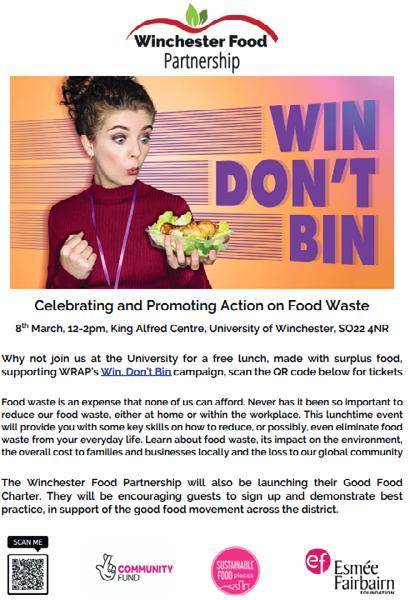
During the week, we challenged everyone to make a difference and at our food Waste event we shared tips and advice on how to reduce food waste at home, such as meal planning and using up leftovers. We had over fifty attendees sign up through Eventbrite who join us at the University of Winchester for our lunch time event, which celebrated and promoted action on food waste Those that attended said they found it really informative and very positive, especially from networking with other attendees
With support from the University, we also launched the Winchester Food Charter. There was wide interest for the charter on the day, with a number of guests signing up, including Sarah Greer, Vice Chancellor, who signed the charter on behalf of the University!
There was a free lunch, made with surplus food, donated by Harvest Fine Food, the university’s fruit and veg supplier, all in support of WRAP’s Win, Don’t Bin campaign for Food Waste Action Week.

PRINCIPLES FOR RESPONSIBLE MANAGEMENT EDUCATION 2022 35
Left to Right; Janet Berry, Chair of the Winchester Food Partnership, Sarah Greer, Vice Chancellor University of Winchester and Dave Morton Catering Manager University of Winchester and Deputy Chair WFP
A SPECIAL HIGHLIGHT: FOOD AND CATERING ON CAMPUS
The University of Winchester continued to be a leader with regards to sustainable food, particularly in the Higher Education sector, but has faced a number of difficulties across the supply chains following in the wake of covid-19. The Catering department have worked hard to provide the most ethical and sustainable catering possible and always look to make improvements in their supply chains to introduce local sustainable products. To that end, the Catering Manager has been working with the Winchester Food Partnership to create a local procurement framework, to encourage increased use of sustainable local producers and suppliers.
Although the ethical food policy supports the procurement of free-range pork and chicken, it has been difficult to maintain regular supplies due to the supply chain issues through covid and the ongoing economic crisis. In fact, the lack of free-range supply has led to the reintroduction of organic beef in some outlets. This option was taken to support the reduction in use of farm assured chicken, as although the carbon footprint has increased slightly, this was secondary to the importance in increasing the use of higher welfare meat, such as organic grass-fed beef, over farm assured chicken.
Organic milk remains the choice for all coffee shops across campus, but organic eggs have been replaced with locally sourced free range, produced at a farm less than two miles from the university. They have maintained their use of Marine Stewardship Council (MSC) fish and associated MSC accreditation. The department continued to buy seasonal and local produce wherever possible, as well as Fairtrade bananas.
The University, as signatory of the Humane Society’s Creature Kind Commitment, continues to endorse the use of non-meat and dairy alternatives, such as organic oat milk and soya milk as well as coconut milk.
The use of oat milk has increase substantially since the decision to remove the charge for milk alternatives in the coffee bars and the introduction of two o local oat milk suppliers, further supports the local economy. Plant based options remain an important part of menu development and alongside , vegan cheese there are a wide number or meat alternatives in use, including salami, bacon, chicken which are available across campus including pizzas and burger toppings as well plant based main courses and snacks. Vegan sausage rolls now rival meat based as the preferred choice.
The department continues to review the purchase of new equipment to include the full life costing and continue to install and maintain energy saving devices such as induction hobs, Frima cooking stations instead of Bratt pans and the new Rational I Combi ovens to replace old gas ovens. All kitchens will also benefit from the variable extract system from quintex. Where possible heat recovery units will be installed, these recycle the heat from remote chillers to create “free” hot water for the department.
The University, continues to be a Hampshire Fare member, supporting individual supplier members. The Catering Manager sits on a number of different groups including The Winchester Fairtrade Network, the National Sustainability group for The University Caterers Organisation (TUCO) and the TUCO palm oil group, which was created in 2018 to work with the Roundtable on Sustainable Palm Oil (RSPO) on a wider accreditation system for universities. The catering manager is now also the deputy chair for Winchester Food Partnership and is working on a local food procurement network, encouraging greater use of local food by the university and other Winchester based public sector companies .
The department has previously been awarded a number of accolades for its sustainable food including;



PRINCIPLES FOR RESPONSIBLE MANAGEMENT EDUCATION 2022 36
• Sustainable Restaurant Association (SRA) 3-star Accreditation, the first University to achieve this. Top 20 status in 2017/18 out of 6,000 SRA businesses

• Soil Association accreditation for a variety of menus including Silver and Gold, although the campus wide audit has placed the department at silver
• Compassion in World Farming (CIWF) Good Egg award for using only free-range eggs
• CIWF Good Chicken award for using only free-range chicken, yet another first for the sector.
• Good Dairy Award for using organic milk, sourced locally when available.
• Received MSC accreditation from TUCO and MSC in 2020
In collaboration with the Humane Society International the department continues to monitoring their CO2e output in relation to meat and dairy use and it’s reduction by the inclusion of plant-based alternatives within the menus. This gradual switch to include plantbased alternatives has seen an overall 39% reduction in Co2e since 15/16, with the largest fall attributed to the removal of beef, although this is expected to rise slightly for the next audit.
Catering continues to support the Better Chicken Commitment and are advocates of the Eating Better campaign (part of the reason to introduce organic
beef). To further support Eating better and raise awareness of reducing meat consumption the team appeared in the national campaign video, which is now used across campus on the departments promotional videos. Winchester continues to work with Friends of the Earth on their Kale Yeah campaign, but the FoE planned accreditation process will no longer continue, however the university recognise the benefits of this green nudging campaign and will continue to promote it as it has produced positive steps to reduce or remove meat from students and staff diets on campus.
To support the improvement of nutrition within recipes as well as the development of cooking programmes, the department have been working with academic departments, including the Faculty of Health and Wellbeing, and the Widening Participation team. The chefs supported weekly cookery classes last summer for the students, providing much welcome development of basic skills as well as ideas for scratch cooking. The classes are being developed to open this up to others in the next academic year
To support the review and development of new dishes and menus for the coming academic year, The Faculty of HWB will be providing several interns over the coming months.
PRINCIPLES FOR RESPONSIBLE MANAGEMENT EDUCATION 2022 37
FOOD AND PRME, 2021-2023
1 The Chefs team have provided cookery sessions for the Widening Participation in August 2022, supporting First Scholars students. We have repeated this for 2023.
2 We worked with Eastleigh college again this year to provide learning support opportunities for their students with a series of events during Fairtrade Fortnight 2023. This had been previously supported by UoW students, but the courses changed.
3 Eastleigh College also provided support for the Catering Team’s team building event in June
4 We have provided ongoing support for Winchester Food Partnership (WFP)– including holding an event in March 2023, for Food Waste Action Week – This event also included working with HWB Dietetics, Environment Team and HCC Love Food Hate Waste. The WFP also used the day to launch the Winchester Good Food Charter and this was signed by Sarah Greer, UoW VC – Poster, Report and pic included.
5 The catering team have been involved in various fund-raising campaigns for local and national groups:
vi) McMillian Cancer Support Mark Brooks MB
vii) Fairtrade Foundation - FTF
viii) Cancer Research – Dave Morton DHM
ix) Movember DHM
x) Children in Need Team
xi) Red Nose Team
xii) Winchester Hospice MB
6 Introduction of the Pantry – refill shop. We aim to remove unsustainable packaging from the shopping experience, whilst promoting and supporting ethical, sustainable and local suppliers and the local economy. Includes eggs, oat milk, fruit and veg, bread, cakes/bakery, milk, fruit juice. alongside household products, such as soaps and detergents. https://www.thepantrywinchester.co.uk/
7 During Go Green Week 22/23 we support the University with differing events – Cup giveaway, pumpkin rescue cooking (Winchester Hub), Food Waste event.
8 UDine Awards 2022 – Shortlisted for Innovation Section – use of allergen awareness portal.
PRINCIPLES FOR RESPONSIBLE MANAGEMENT EDUCATION 2022 38

39 PRINCIPLES FOR RESPONSIBLE MANAGEMENT EDUCATION 2022

40 PRINCIPLES FOR RESPONSIBLE MANAGEMENT EDUCATION 2022
INTEGRATED REPORTING

ADVANCE HE
The University of Winchester is one of only ten universities to have taken part in an AdvanceHE project to develop Integrated Reporting (IR) in UK higher education institutes. The project explores the potential to change the way HEIs report on their wider use of resources – not just their finances – to the benefit of all stakeholders such as students, employees and their local communities.
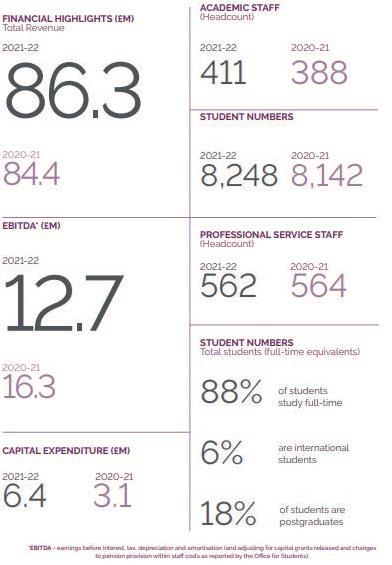
THE INTEGRATED REPORT 2022

Winchester’s most valuable capital resources include:
• Staff and students
• Business partners

• Social and relationship capital


• Intellectual capital


These are underpinned by Winchester’s Financial capital, Campus estates, and Natural resources
In preparing for this year’s report, Winchester has fully embedded integrated thinking in its core operations
PRINCIPLES FOR RESPONSIBLE MANAGEMENT EDUCATION 2022 41
HOW WE CREATE VALUE
We are committed to integrated thinking e strategic plan and our drive for organisational excellence, continuing the journey to adopt the principles of integrated reporting in this year’s annual report. Winchesters’ value creation model (VCM) is a at the heart of the integrated thinking and reporting. The model continuously evolves and highlight our commitment to ensure we are sustaining and adding value for all our stakeholders. The VCM is at the centre of our strategic objectives, with sustainability, student and staff satisfaction and research and learning running through all the outputs. Over the last year, Winchester has further embedded the United Nations Sustainable Development Goals within strategic objectives and aligned them to key outputs of the model.

THE ROLE OF HUMAN RESOURCES REMAIN VITAL


The University’s values are integral to our HR policies, for example in our commitment tore included in staff induction and for staff undertaking the Post Graduate Certificate in Education.
Our statement of Modern Slavery: www.winchester.ac.uk/about-us/sustainability-andsocial-justice/modern-slavery

PRINCIPLES FOR RESPONSIBLE MANAGEMENT EDUCATION 2022 42
HIGHLIGHTS FROM OUR RECENT REPORT
CASE 1 – STUDENT NURSING TIMES AWARD
University of Winchester student nurse Cyzel Gomes shortlisted for a Student Nursing Times Award 2022. The Award recognises a student who has made an exceptional contribution to creating a supportive and inclusive environment for their patients and/ or other students and staff, showing compassion and understanding of the needs of those from diverse backgrounds.
Cyzel, who is in her final year studying on the BN (Hons) Nursing (Adult) degree course is one of just seven student nurses from around the country nominated for the Mary Seacole Award for outstanding contribution to diversity and inclusion. Some of the reasons for Cyzel’s nomination include her involvement in the University’s HEART group (Health Education and Social Work AntiRacist Transformers), providing a safe space for students to talk about their personal experiences in their study and practice. She is also a champion of Breaking Through, a studentfocused group proving another forum to talk about issues that are often uncomfortable to confront.
Speaking about her shortlisting, Cyzel said: “I couldn’t and still struggle to believe it, that I have been nominated for an award at the Student Nursing Times Awards. It’s unbelievable but I am so humbled and feel so blessed for the recognition for all my work for equity, diversity and inclusion. I really believe that only together we will overcome the prejudices, discrimination, racism and colourism; making the world a much better place for the future generations to come. This nomination isn’t just for me, it’s for all the other Cyzels out there that are changing the world every day, with little acts of kindness. Especially for those that champion equity, diversity and inclusion and may have felt on many occasions, uninvited and unseen at the table.”
Cyzel is a real advocate for social justice, and we are incredibly proud of what she has achieved as a student nurse, which has culminated in her nomination for the Nursing Times award.
CASE STUDY 2 – IMPLEMENTING HEALTH ENHANCING LIFESTYLE PROGRAMME
The HELP (Health Enhancing Lifestyle Programme) is a community-based exercise and education programme that supports the health, wellbeing and recovery of individuals diagnosed with stroke.
This programme is a collaboration between the University of Winchester, National Institute for Health Research (NIHR) Applied Research Collaboration (ARC) Wessex, Hampshire Hospitals NHS Foundation Trust, and in particular the Hyper-Acute Stroke Unit, and Hobbs Rehabilitation, an independent provider of neurophysiotherapy.
The programme has been running for 3.5 years, and delivers face-to-face exercise classes following a short hiatus whereby only online exercise classes were delivered due to the Covid-19 pandemic. Data collected from participants in the programme is embedded within a Health Research Authority ethically approved research study. Findings from this study will be available at the end of academic year 2023/24 and will be in our next PRME SIP report.
CASE STUDY 3- WESTERN BOTANICAL KNOWLEDGE
University researchers are currently working on a project dedicated to unearthing indigenous Caribbean contributions to Western botanical knowledge, as one of ten projects funded by the Arts and Humanities Research Council (AHRC) and the Natural Environment Research Council (NERC) as part of their ‘Hidden histories of environmental science’ call which seeks to understand how the future of modern environmental science can be informed by the past.
This project will digitise the Dr Alexander Anderson archives held by the Linnean Society and the Natural History Museum, including his important Hortus St Vincentii which details the plants growing in St. Vincent’s Botanical Garden (SVBG) in 1800, and includes a number of botanical illustrations. Several of these are by John Tyley, a young African-Caribbean man; at this time, it was very unusual for botanical illustrations to be signed, especially by an AfricanCaribbean.
PRINCIPLES FOR RESPONSIBLE MANAGEMENT EDUCATION 2022 43
Digitisation of Anderson’s Caribbean natural histories, and his details of plants growing in the SVBG, will allow global on-line access to these important historic resources for the first time. The project will also interrogate the digitised archive against wider material; letters sent by Anderson held at Kew Gardens, and receipts relating to SVBG and further plant catalogues held at the National Archive.
The entire Anderson archive will then be analysed to detect and document the contributions made by the indigenous (Carib/Garifuna) and enslaved African peoples whose knowledge and physical labour fed into successful development of SVBG, and western scientific knowledge more generally.
CASE STUDY 4 - CONTRIBUTION TO THE CITY AND REGION: BUSINESS AND HEALTH
We are proud to be the University of the city of Winchester, and to make a significant contribution to the city and wider region. Independent economic impact analysis has shown that the University contributes more than £266m to the regional economy. We are a major local employer, and also the provider of a much-needed local workforce, contributing nearly 10,000 jobs a year into the regional economy.
We work hard to support the community in many different ways. The University holds the Social Enterprise Gold Mark in recognition of its works as a social enterprise, creating benefits for people and the planet. Additionally, in 2021, the University of Winchester Business School was awarded the Small Business Charter Award in recognition of its support for small businesses, student entrepreneurship, and its commitment to the local economy.
We are an active corporate supporter of the work of the Winchester Business Improvement District to sustain and grow business in the city. Each of these initiatives underlines the University’s commitment to the local business community and to being a good corporate citizen.
The city of Winchester is regularly voted as one of the best places to live in the UK. The University campus is also a compelling mix of old and new, offering a traditional learning environment with a stunning contemporary twist. Our most recent development is the £50 million learning and teaching building, the
West Downs Centre. Opened in 2021, the Centre, which has strong green credentials, this building was one of the first university projects in the UK to be registered for WELL Certification, an accreditation scheme recognising buildings that support and advance human health and wellbeing. The West Downs Centre has won a number of national and international awards, including the coveted World Architecture News Gold Award and the Civic Trust award, where the judges recognised not just the enhancement of the University teaching facilities and campus, but also of the wider neighbourhood.
A striking art installation was created in the University of Winchester’s West Downs Gallery in the summer of 2022, with visitors from the community working with artists on a sculptural work representing sanctuary. ‘Open Sanctuary’ was a sculpture made from hundreds of individual ceramic balls which, formed a circular space for visitors to sit quietly and meditate on what ‘searching for sanctuary’ means for them.
In a series of workshops led by artists Fiamma Colonna Montagu and Sam Selwyn Bazeley, participants were guided through a meditation whilst creating a ceramic ball using natural clays. After firing, each ball will be slotted onto a large circular armature to slowly build the sculpture, until the work is complete.
The hope is that after the exhibition the sculpture will find a permanent home in the city of Winchester as a space for residents and visitors alike to gather, whatever their faith, to be able to meditate on what ‘searching for sanctuary’ means for them individually.

PRINCIPLES FOR RESPONSIBLE MANAGEMENT EDUCATION 2022 44
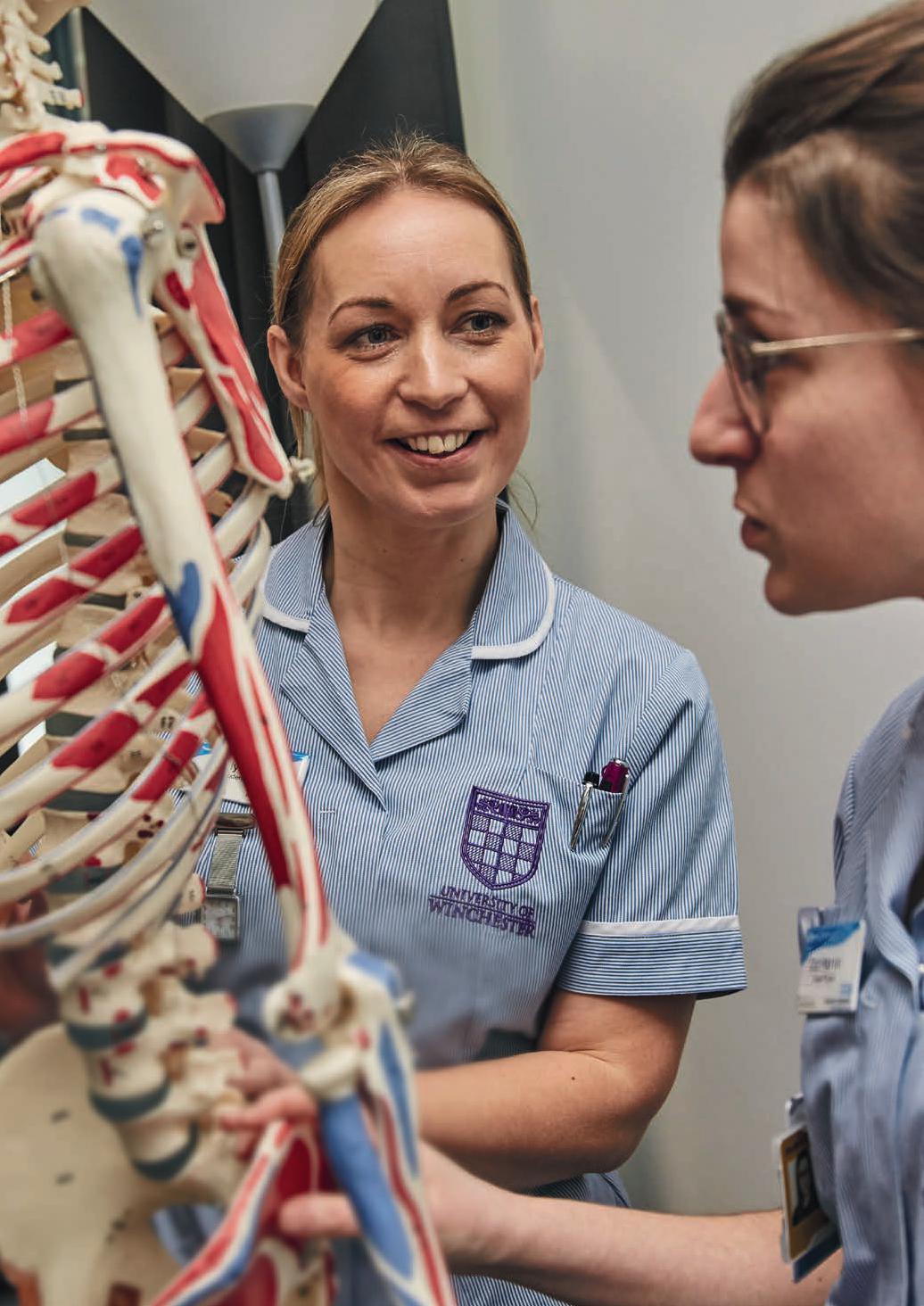
45 PRINCIPLES FOR RESPONSIBLE MANAGEMENT EDUCATION 2022

46 PRINCIPLES FOR RESPONSIBLE MANAGEMENT EDUCATION 2022
ENVIRONMENTAL STRATEGIES
The Environment Strategy commits the University to reducing its environmental impact and embedding sustainability at every level of the institution and in all areas of the curriculum through the Education for Sustainable Development Programme.
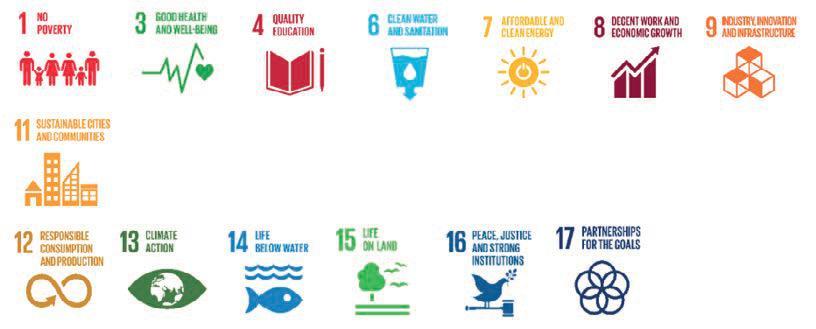
The Environment Strategy is produced in line with the requirements of all University Policies and Strategies
BIODIVERSITY
including the Equality and Diversity Policy, Sustainable Development Policy, Biodiversity Action Plan, Travel Plan, Carbon Management Plan, Climate Change Education Strategy, Waste Management Policy, Ethical Catering Policy, Sustainability Engagement Strategy, Ethical Banking Policy, proposed Sustainable Buildings Policy and Ethical Investment Policy.
Aim – Enhance biodiversity on campus We will implement actions within the Biodiversity to enhance biodiversity on campus by:
• minimising chemical use in fertilisers, herbicides and pesticides
• increasing pollen and nectar sources in planting schemes
• timing estates works so as not to interfere with the bird nesting season (MarchAugust)
• purchasing and using peat-free compost as standard
• developing a green space metric to track the amount of green space across the University’s estate to ensure any development on green space is appropriately mitigated and produces a biodiversity net gain
• supporting use of the campus grounds as an educational and wellbeing resource for students, staff and the community at large
• monitoring and maintaining swift nesting locations in University buildings on campus and in the city, including University Managed Housing
• working with Winchester City Council on conservation tasks at Westhill Cemetery to improve the chalk grassland habitat, recruiting staff and student volunteers for tasks
• improving habitat to encourage bird, bat and small mammal nesting opportunities
• improving planting of native flowers and trees
PRINCIPLES FOR RESPONSIBLE MANAGEMENT EDUCATION 2022 47
EDUCATION AND RESEARCH
Aim – Every graduate to understand the impact of climate change.
We will ensure that every graduate has understood how climate change is relevant to their discipline, the effect on social justice, the ubiquitous impact and the urgency of the challenges presented by climate change.
We will do this by:
• supporting the development of the Climate Change Education and Communications Research Centre
• embedding sustainability and building links between formal and informal curricula
• embedding the 17 Sustainable Development Goals into all areas of the curriculum along with promoting them to prospective students and the wider community
• supporting faculties and degree programmes where needed and inputting on lectures and talks to students
• supporting the Institute of Values Studies and inputting in to the debate and teaching materials on ‘nature’ in the Contemporary Conversations module
• promoting the campus as a Living Lab, encouraging students to undertake estates projects related to sustainability
• embedding sustainability within the module and programme surveys, tracking student feedback on sustainability, with the aim of seeing further inclusion and satisfaction in this area over time

• fostering an institutional culture of sustainability where collaboration between academic staff, nonacademic staff, students and community members occurs organically across the institution
• identifying and promoting examples of good practice for inclusion of sustainability in teaching, learning, and research across the University; including relevant legislative, economic, technical, social and market developments
PRINCIPLES FOR RESPONSIBLE MANAGEMENT EDUCATION 2022 48
SUSTAINABLE PROCUREMENT
Aim - Embed sustainability into the procurement process. We will reduce our carbon emissions from procurement by 10% below the baseline year of 2018/19 by 2025.
The University will ensure that environmental and ethical responsibility is considered in all purchasing decisions, tenders and contracts, in line with the proposed Procurement Policy published in 2016. We will work with the Procurement and Ethical Supply Chain Manager to ensure procurement decisions seek to ensure that goods and services are procured by:
• questioning whether goods and services are definitely necessary by exploring opportunities of whether the product already exists on campus and is available to use
• not endangering human or environmental health and minimising damage to the environment via obtaining the original resource, resource use, manufacturing methods, pollution, emissions and other waste by-products throughout the life cycle
• running in line with the University’s Carbon Management Plan, all electrical goods/services are to be Energy Saving Trust certification minimum A rated and European Union Energy Star rated. Government Buying Standards and Green Public Procurement recommendations should be sought
• having minimal packaging and where possible, utilising recycled and recyclable packaging and operating/offering a packaging take-back compliance scheme
• prohibiting the use of materials derived from threatened ecosystems, species or environments, and avoiding products and services that cause cruelty to animals
• supporting the principles of fair and ethical trade, and social and ecological labels selecting in accordance with whole life costs and benefits
• sourcing from recycled materials
• ensuring products are durable, recyclable, repairable, refillable or re-usable as appropriate
• sourcing from suppliers who can demonstrate sound sustainable practices throughout their own supply chain
• sourcing locally and where this isn’t possible ensuring sustainable modes of transport are used
ETHICAL BANKING AND INVESTMENT
Aim – Give due consideration to the environment, ethics and social justice when banking and investing We will commit to environmental sustainability through the implementation of our Ethical Banking and Investment Policy. We will not investment in fossil fuels. We will receive no research funding from the fossil fuel industry. We will remain accredited by the Living Wage Foundation as a Living Wage employer. The use of positive ethical criteria in assessing institutions is firmly incorporated within the University’s Ethical Banking and Investment Policy through a process of constructive engagement with business using our ethical assessment criteria for Environmental, Social and Governance (ESG)
PRINCIPLES FOR RESPONSIBLE MANAGEMENT EDUCATION 2022 49
SUSTAINABILITY ENGAGEMENT
Aim – Create and maintain a culture of sustainability We will increase the number of local charities the University engages with by 20% above the base line year of 2017/18 by 2025.
• We will ensure at least 90% of students are satisfied that the University encourages good environmental practices.
• We will ensure 100% of new staff receive information on the environment and sustainability during their induction process.
• We will ensure that at least 80% of staff perceive the University as an environmentally sustainable institution.
• We will continue and build upon engagement to further develop students, staff and the local community capacity and knowledge, and influence wider policies.
• We will increase awareness of environmentally sustainable development within the University and externally, including through collaboration with the local and regional communities.
• We will create and maintain an institutional culture of sustainability, social justice and the Sustainable Development Goals (SDG).
• We will ensure staff and students develop an understanding of ecologically sound, socially just and economically viable concepts of sustainable development.
• We will expand our work with the local community to improve initiatives in environmental sustainability by:
• supporting opportunities to work collaboratively with the local community to enhance provision of student learning and volunteering off campus relating to environmental and social sustainability.
• continuing to support Winchester Action on Climate Change (WinACC)
• encouraging participation in environmentally sustainable behaviour and activities amongst staff and students
• continuing to enhance the reputation of the University within the local community, business and the Higher Education sector, which in turn will lead to greater opportunities for collaboration and improved student attraction and retention
• We will engage with students to create awareness of the SDGs to enable them to understand the need for individual and collective action in relation to these global and local challenges by:
• equipping our graduates with the skills, knowledge and attributes to make a positive difference in their future careers and lives.
• developing curriculum content for all students which develops environmentally responsible citizenship.
• supporting and encouraging interdisciplinary research on sustainability, social justice and the SDGs
• working with schools to help them practice, teach and promote sustainability.
PRINCIPLES FOR RESPONSIBLE MANAGEMENT EDUCATION 2022 50
SUMMARY OF TARGETS

PRINCIPLES FOR RESPONSIBLE MANAGEMENT EDUCATION 2022 51
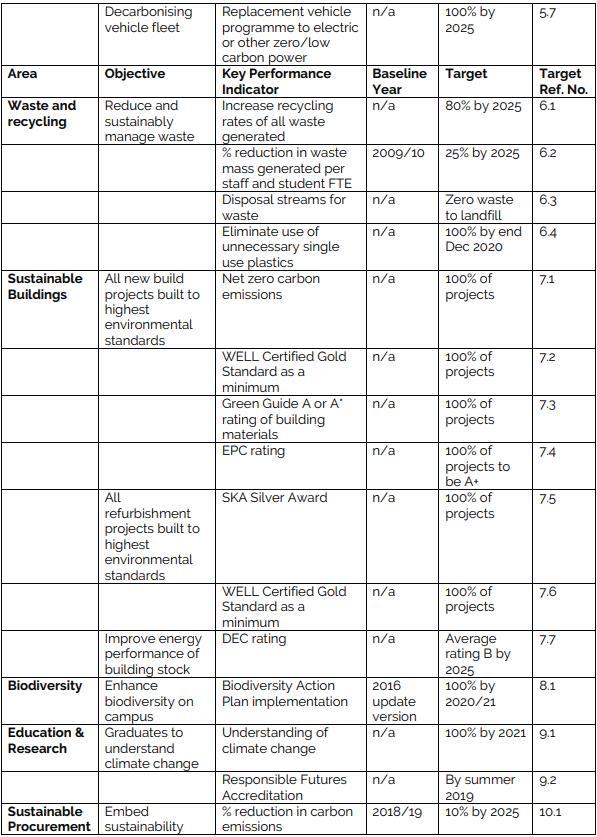
PRINCIPLES FOR RESPONSIBLE MANAGEMENT EDUCATION 2022 52
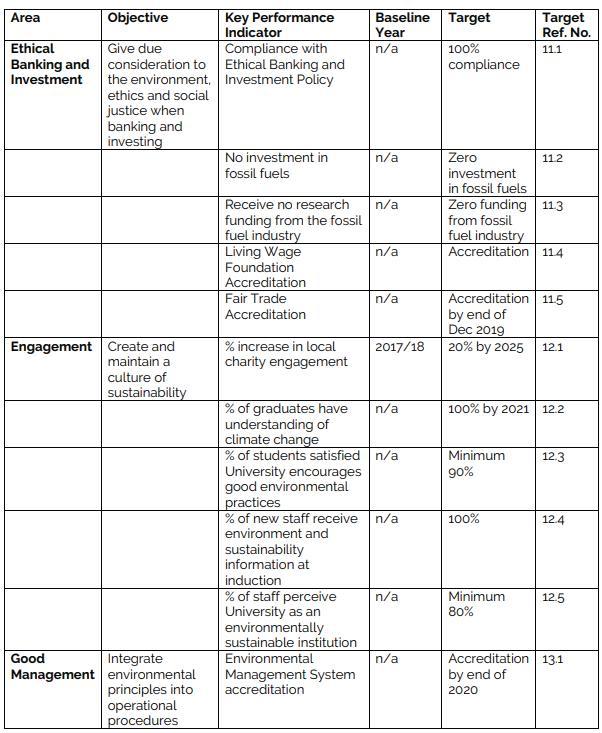
PRINCIPLES FOR RESPONSIBLE MANAGEMENT EDUCATION 2022 53
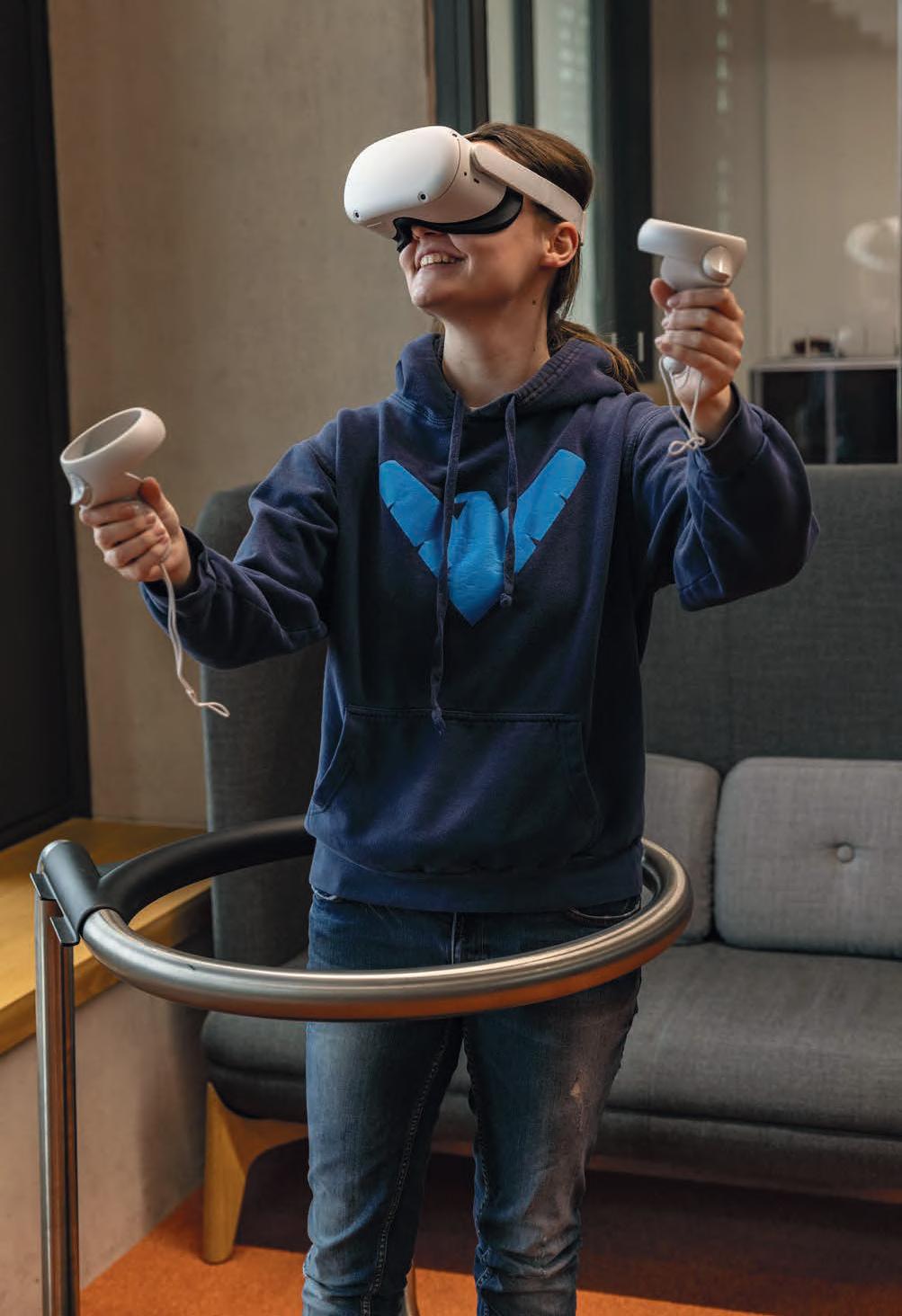
54 PRINCIPLES FOR RESPONSIBLE MANAGEMENT EDUCATION 2022
RESEARCH AND PUBLICATIONS



WE WILL CONTINUE TO PURSUE INTERDISCIPLINARY, HIGH-IMPACT RESEARCH ACROSS A BROAD RANGE OF PRME-RELATED SOCIETAL CHALLENGES, FROM CLIMATE CHANGE MITIGATION AND LOW-CARBON ENERGY SYSTEMS TO ANTI-MODERN SLAVERY AND RESPONSIBLE BUSINESS PRACTICES.
We believe businesses cannot truly thrive unless the communities (local, regional, national and global) in which they exist, and which sustain them, also prosper. As a School, we take seriously the fact that the challenges facing any given business or industry cannot be fully understood without due appreciation of the broader political, regulatory, economic and social contexts in which they are situated. Equally, we believe we have a duty to ensure our research benefits
not only individuals or firms, or even entire industries, but also society at large. For this reason, much of our research addresses pressing societal challenges, including the roles of policy and practice in achieving the SDGs, and the regulatory frameworks within which organisations must operate in order to discharge their moral and social obligations.
SDG 4 and relevant targets for business schools (UN, 2022)
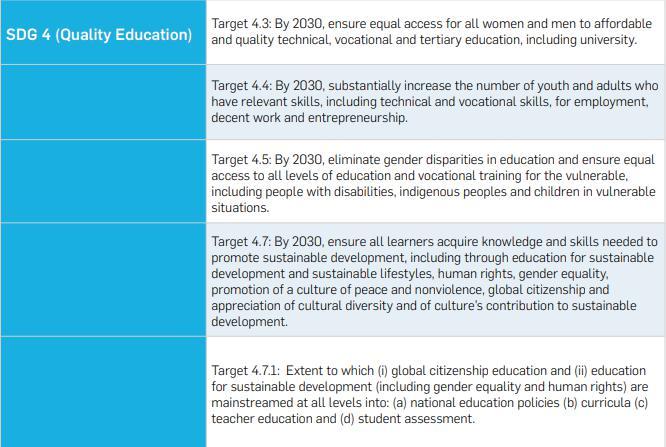











PRINCIPLES FOR RESPONSIBLE MANAGEMENT EDUCATION 2022 55
RESEARCH PROJECTS AND PARTNERSHIPS
ESRC-SSHRC INTERNATIONAL FUNDED PROJECT: UNDERSTANDING THE FUTURE OF CANADA-UK TRADE RELATIONSHIPS
The award was intended to provide extensive capture on the existing academic and professional status of the circular economy to inform diplomats involved in Canada-UK trade negotiations. Dr Paul Sheeran is leading this project from the University of Winchester.
Phase 1 - The output linked to the paper, conferences and chapters include:
Professional Conferences/Workshops/Report:
• Presentation to UK-Canada Ambassadors, International Trade Officials and diplomats.
• Sheeran, P. (2018) The Future of UK-Canada Trade Relations – Ottawa Government House, Canada
• Sheeran, P (2018) Roundtable Event Canada House – International Free Trade Agreements USMC v CTPP11, Canada House, London – speaker and participant
• Sheeran, P (2018) ESRC-SSHRC UK-Canada Workshop - Research Presentation, (Speaker and Participant), Amba Hotel, Charing Cross, London
• Sheeran, P (2020) ‘Economic and Trade considerations of circular economy approaches’ in Tudor, T. and Dutra, C. The Routledge Handbook of Waste, Resources and the Circular Economy.
• De Lange, D, Welsh, P, and Sheeran, P. (2021) University College Dublin (2021) presentation paper: ‘Understanding the Future of Canada-UK Trade Relationships in a Circular Economy Context.’
• De Lange, D, Welsh, P, and Sheeran, P. (2022) ‘UKCanada Trade Post-Brexit: Leading with Circular Economy Trade Resources’, Journal of Conservation & Recycling Advances
Phase 2. 2023-25
Comparative circularity: Vancouver, Amsterdam and London
• The extensive comparative analysis will provide insight on the progress and limitations of circularity in key cities committed to the circular economy. The research builds on the earlier UK-Canada research and will include interviews with persons working on a range of circularity programmes and projects in the selected cities. The intended output will target a 4* journal and wider research output dissemination.
KNOWLEDGE EXCHANGE PROJECT
Constructing a PeopleScapes, UoW – Hampshire Chamber of Commerce, Sustainability reporting, led by Professor Denise Hewlett and Dr Ian Blakesley
This work will result in a sustainability reporting tool. This will be used for SMEs to monitor how effective their respective businesses are in terms of social, economic and environmental impacts. The tool will link to the UN Sustainable Development Goals. This work is inspired by COP26, work progressed throughout 2021 by Hewlett with the Hampshire Chamber of Commerce, in relation to ‘greening up businesses across Hampshire’ and by our successfully awarded first DBA, Dr Ian Blakesley whose research focused on the subject of sustainability reporting. The tool was launched to SMEs at an event being held at the University of Winchester on 5th October 2022. The plan is that this tool will be updated by SMEs, according to their responsible business activities, and on a quarterly basis, their information will be uploaded to a central database/recording system. The data collated will be evaluated by Hewlett, Blakesley and the HCoC and an award system will be designed, that recognises achievements of SMEs in terms of their greening up their businesses. This activity is planned to result in two further SME-public networking events being created, and will result in a final event, that will be promoted across the media.
PRINCIPLES FOR RESPONSIBLE MANAGEMENT EDUCATION 2022 56
PUBLIC/COMMUNITY ENGAGEMENT – CONTRIBUTION TO NARRATIVE:
This entire project is built upon public engagement, through the inclusion of a working group and steering group comprised of HCoC members, Hewlett and Blakesley, discussing the short-term activities –contstructing the sustainability tool; medium term a series of events 2022/2023, and long-term vision for providing a tangible outcome to greening up businesses across Hampshire over the next potentially 3-5 years. Invitees to these events will comprise of SMEs across Hampshire.
Hampshire Chamber of Commerce will contribute the additional £1,000 needed to complete this project. They will also contribute in-kind contribution to the progression of the projects, up to the value of £2,000. This is made up of the Executive Chair, and working group members time in contributing to the design and review of the sustainability tool.
PRME BLUEPRINT INSPIRATION GUIDE INPUT FROM THE UNIVERSITY OF WINCHESTER
EXAMPLES OF A FACULTY-LED PARTNERSHIPS
CASE 1- Nottingham Business School collaborated with other HEIs, including the University of Winchester in the United Kingdom and OIKOS, for the “Pass It On” initiative. The partnership shows how popular music can be used as a way to discuss climate change and climate action and illustrate the voice of young people on climate. In this collaborative effort, a workshop was conducted with international students and university staff. Each person was asked to write a paragraph about what climate change means to them, what the environment means to them and what the future looks like to them.
CASE 2 - Glenn Fosbraey, senior lecturer in creative writing at The University of Winchester, shaped the responses into lyrics, wrote accompanying music, and then brought his work to the university’s recording studios. The song was produced by Niall Thomas, sung by Winchester graduate Hannah Jacobs and the music performed by staff members. The song was then used in higher education in two ways. Firstly, as a template to engage students from different countries, subject areas and universities in a proactive discussion about climate change. Secondly, as a conversation starter to help elicit new ideas or projects. It is especially suited to discuss actions related to SDG 7 (Affordable and Clean Energy) and SDG 13 (Climate Action). As it tries to “shake up” students into keeping our world as beautiful as it is, it can be used to prompt behavioural changes with regards to any of the SDGs. Listen to the song Pass It On here.
CASE3 - SDG Integration in Curriculum by Prof Maria Burke. An excerpt from the input, “The Sustainable Developments Goals (SDGs), provide an aspirational but complex framework for the next decade and beyond. At Winchester, the integration of the SDGs is the driving imperative in our continuum of further embedding responsible management education. COVID-19 has impacted all Universities and their communities in the last year. However, the collaborative approach to developing responsible management education continues and this includes SDGs working with other organisations in this space. One example of this is the Students Organising for Sustainability (SOS) - the sustainability charity of the UK National Union of Students (NUS) and it’s ‘Responsible Futures’ programme. This takes a whole institution approach and uses the framework of the Formal Curriculum (courses/ programmes), Informal Curriculum (campus/ community activities) and Subliminal Curriculum (organisational policy/ practices) and encompasses both the SDGs and the University values. Using this process, progress has been made on embedding the SDGs across all Faculties of the University. In addition, the PRME principles have continued to underpin our formal curriculum on our Business Management degrees from first year undergraduates, to Masters students.”
PRINCIPLES FOR RESPONSIBLE MANAGEMENT EDUCATION 2022 57
Dr. Maria Emmanouilidou has ongoing research projects on:
a) Sustainable Development in Higher Education: A Competence-based Lens
The project explores students’ perceptions on the effect and links between pedagogical methods, professional experience, and the acquisition of sustainable development competences. The study’s research question is: What is the relation between pedagogical methods and competences for Sustainable Development and the effect on professional career development? This research study investigates the emerging research field of sustainable development competences and the interrelation with student’s academic experience and professional development.
Primary data was collected from UG and PG students from the following degree courses:
• BA in Accounting and Finance
• BA in Business Management
• BSc in Computer Science

• BSc in Economics
• BA in Event Management
• BA in Fashion Marketing
• BA in Marketing
• MSc in Cyber Security
• MSc in Digital Marketing and Analytics
• MSc in International Business Management
• MSc in Project Management
b) Towards Sustainable Healthy Diets
The research question for this study is: What are the views and consumer habits on sustainable healthy diets of the adult population in UK? It investigates consumers’ perceptions and patterns on sustainable healthy diets. In line with the sustainable development goals set by the UN there is a growing need at a worldwide level for a shift towards sustainable healthy diets to address adverse health outcomes and minimise environmental impacts. It is therefore important to undertake research to understand consumers’ dietary behaviours and perceptions to effectively promote healthy and sustainable diets and to support the achievement of the UN sustainable goals The target population for this research study are adults in the UK (England, Wales, Scotland, and Northern Ireland).
PRINCIPLES FOR RESPONSIBLE MANAGEMENT EDUCATION 2022 58
SELECTED PUBLICATIONS
Taghizadeh, S.K., Radomska, M., and Rahman, S.A.) Innovation Infrastructure and Innovation Propensity for SMEs Business Performance, European Economic Letters, 13 (3) (2023)
Anwar, C.M. Sakib Public Good Provision with a Distributor, Multiple authorship: 1st author. Source: ArXiv: https://arxiv.org/abs/2210.10642 (2022)
Anwar, C.M. Sakib. Pricing and Electric Vehicle Charging Equilibria, Multiple authorship: 4th (last) author; 2nd author is in same UoA. Source: https://arxiv.org/ abs/2210.15035 (2022)
Badwan, Abdul. Evaluating Mentorship-based Learning in Entrepreneurship Education. Multiple authorship: 1st author. Source: Int. Review of Entrepreneurship 20:6986 (2022)
Burke, Maria. Education in a datafied world: Balancing children’s rights and school’s responsibilities in the age of Covid 19, Multiple authorship: 3rd (last) author. Source: Computer Law & Security Review 45:105664 (2022)
García Portilla, Jason. Ye Shall Know Them by Their Fruits: A Mixed Methods Study on Corruption, Competitiveness, and Christianity in Europe and the Americas, Sole authorship. Source: Springer (2022)
Gunton, Richard. Valuing beyond economics: A pluralistic evaluation framework for participatory policymaking, Multiple authorship: 1st author. Source: Ecological Economics 196:107420 (2022)
Ivanov, Plamen. Deciphering the Chinese Economic Miracle: The resolution of an age-old economists’ debate – and its central role in rapid economic development, Multiple authorship: 2nd author (3rd author is in same UoA). Source: Review of Political Economy. (2022)
Lestar, Tamas. A Seventh-day Adventist farm community in Tanzania and vegetarianism as a social practice, Sole authorship. Source: J. Organizational Ethnography 11:294-315 (2022)
Pilato, Manuela. Consumers’ Attitudes and Purchase Intention for a Vitamin-Enriched Extra Virgin Olive Oil, Multiple authorship: 6th author. Source: Nutrients 14:1658 (2022)
Séraphin, Hugues. The digital traveller: implications for data ethics and data governance in tourism and hospitality, Multiple authorship: 5th (last) author. Source: J. Consumer Marketing 40:155-170 (2023)
Séraphin, Hugues. Determining and making sense of recruitment practices for tourism academics in the UK, Multiple authorship: 1st author. Source: Int. J. Organisisational Analysis https://doi.org/10.1108/ IJOA-02-2022-3173 (2022)
Séraphin, Hugues. Language diversity and literature reviews in tourism research, Multiple authorship: 1st author. Source: Tourism, Culture & Communication https://doi.org/10.3727/109830422x16600594683517 (2022)
Sheeran, Paul. UK-Canada Trade Post-Brexit: Leading with Circular Economy Trade, Multiple authorship: 3rd (last) author. Source: Resources, Conservation & Recycling Advances 14:200081 (2022)
Werner, Richard. Are lower interest rates really associated with higher growth? New empirical evidence on the interest rate thesis from 19 countries, Multiple authorship: 2nd (last) author. Source: Int. J. of Finance & Economics. 2022:1-16 (2022)
Kan, V. and Mukhopadhyay, B.R. The role of Migration in Women Entrepreneurship and Empowerment: Evidence from Nigeria, Journal of Women’s Entrepreneurship and Education, 1-2, pp 187-212, (2022)
Mukhopadhyay, B.R. Gender and Renewable Energy impacts six SDGs, North East Colours, Editorial, (2023)
Mukhopadhyay, B.R. Business, Economy, Society: Tales from the Pandemic Days, Southampton Solent University, United Kingdom (2022)
Mukhopadhyay, B.R. Building ecosystems to support entrepreneurs and Startups, The Sentinel, Editorial (2022)
Mukhopadhyay, B.R. Essential HR roles in the ‘Next Normal’, North East Colours, Editorial (2022)
Mukhopadhyay, B.R. Renewable Energy and Women Entrepreneurship, Tripura Times, Editorial (2022)
PRINCIPLES FOR RESPONSIBLE MANAGEMENT EDUCATION 2022 59
Mukhopadhyay, B.R. When Sharing is Caring and also Profiting: On Open Innovation, The Sentinel, Editorial (2022)
Mukhopadhyay, B.R. Online Labour Platforms need to improve the ‘Ease of Doing Business’, North East Colours, Editorial (2022)

Mukhopadhyay, B.R. Water, Water Everywhere, but not a Drop to Drink, The Sentinel, Editorial (2022)
Mukhopadhyay, B.R. Responsible Businesses, Shared Value Creation, and Sustainability, Tripura Times, Editorial (2022)
Mukhopadhyay, B.R. Principles vs Pragmatism: Business Case for Sustainability, The Sentinel, Editorial (2022)
Mukhopadhyay, B.R. The interplay between Climate Change and Agriculture: ‘It’s not You, It’s Me’, North East Colours, Editorial (2022)
Mukhopadhyay, B.R. Circular Economy: ‘Make-UseReturn’, Cassandra Voices, Special Feature for Science and Environment (2022)
PRINCIPLES FOR RESPONSIBLE MANAGEMENT EDUCATION 2022 60

61 PRINCIPLES FOR RESPONSIBLE MANAGEMENT EDUCATION 2022
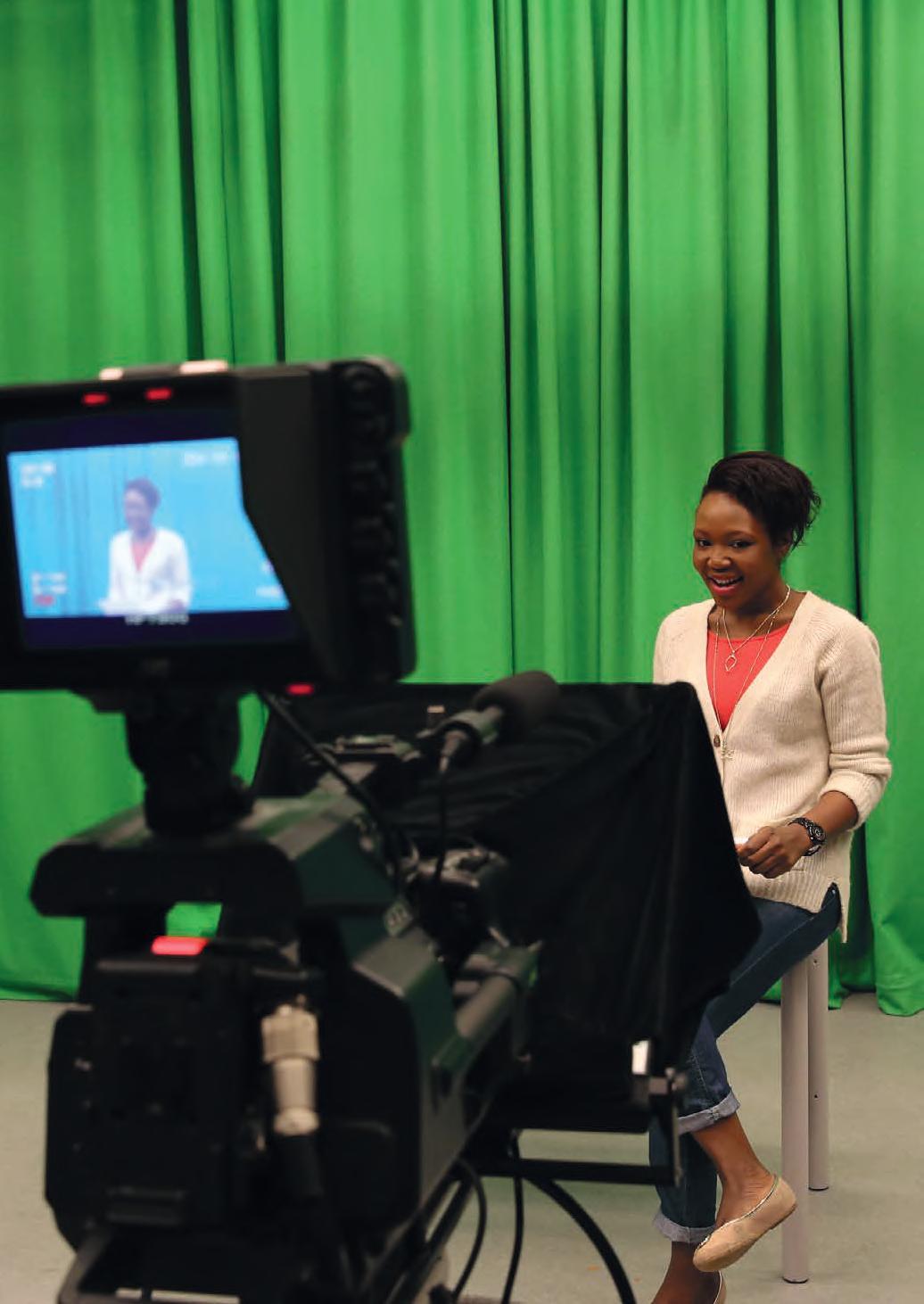
62 PRINCIPLES FOR RESPONSIBLE MANAGEMENT EDUCATION 2022
PARTNERSHIPS


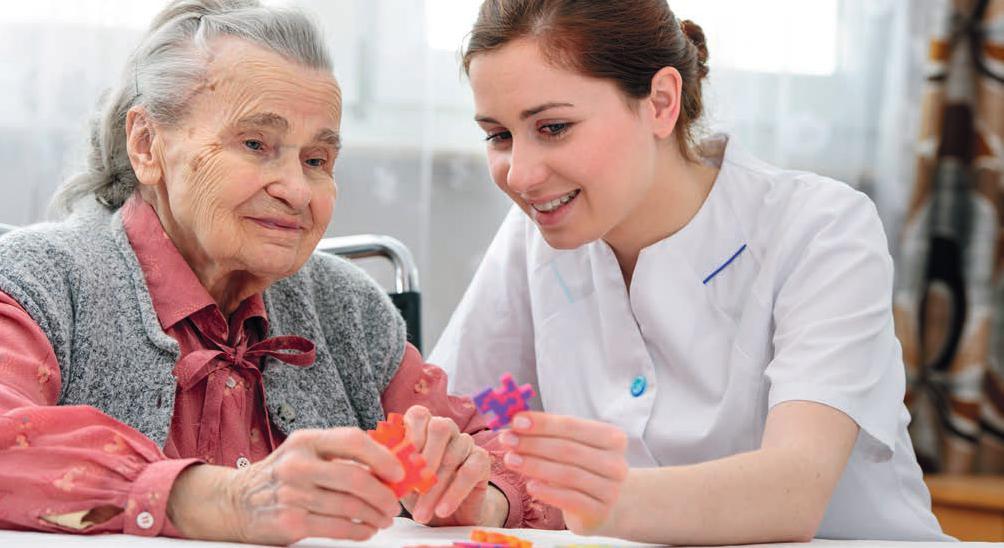
THE LIST OF OUR ONGOING RESEARCH PROJECTS, KNOWLEDGE EXCHANGE PARTNERSHIPS, AND PUBLICATIONS EVIDENCE A STRONG ALIGNMENT WITH THE TYPOLOGY OF SDG PARTNERSHIP AS ILLUSTRATED BY PRME (2020) IN THE FIGURE BELOW.
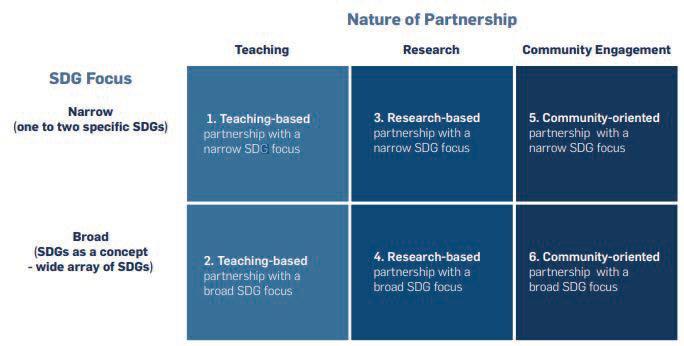
PRINCIPLES FOR RESPONSIBLE MANAGEMENT EDUCATION 2022 63
ENGAGEMENT
Demonstrating the importance of the business school sector in SDG implementation
• Working across the business school sector, professional academic and accreditation bodies, and businesses to showcase ways in which business schools are contributing to the SDGs
• Undertaking steps to ensure the voices of business schools are heard in local dialogues about National Action Plans and implementation of the SDGs
• Leveraging business school partnerships and networks to stimulate sector-wide action on the SDGs; and
• Critically evaluating the ways in which SDG National Action Plans are being developed, communicated, implemented and evaluated.
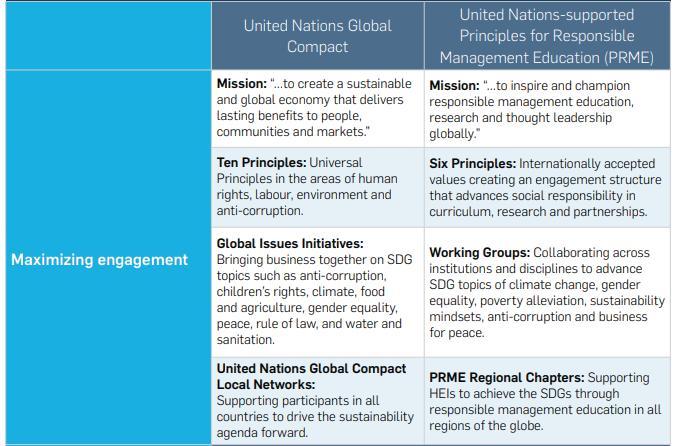
PRINCIPLES FOR RESPONSIBLE MANAGEMENT EDUCATION 2022 64
PRME (2022)
INTERNATIONAL PRME SYMPOSIUM, UNIVERSITY OF WINCHESTER,
JULY 13TH AND 14TH, 2023
Dr Boidurjo Rick Mukhopadhyay organised an International PRME symposium, first of its kind in a hybrid mode in July 2023. This event will be an annual event starting AY 22/23. Rick describes the agenda as “While maintaining a strong interdisciplinary and triple-helix programme agenda that brings together purposedriven speakers from across sectors, the 2023 PRME Symposium at the Winchester Business School will ignite a comprehensive set of discussion and debates on how and where business schools can continue to effectively further the sustainable development
agenda, both nationally and internationally, in a changing higher education landscape today. Our PRME symposium will learn from regional businesses that are actively contributing to the Sustainability agenda, UK and non-UK PRME Champions & Chapter Leaders, and Research institutions working on SDGs and ESGs, to advance responsible management education and its wider impact on global civil society along with re-evaluating the financial feasibility of being a ‘responsible business’ with implications for Society 5.0.”

PRINCIPLES FOR RESPONSIBLE MANAGEMENT EDUCATION 2022 65
WINCHESTER ACTION ON CLIMATE CHANGE (WINACC)

The University supports and works collaboratively with Winchester Action on Climate Change (WinACC) a community organisation that ‘thinks globally and acts locally’.WINACC is located at the University and undertakes a variety of events, activities and campaigns.
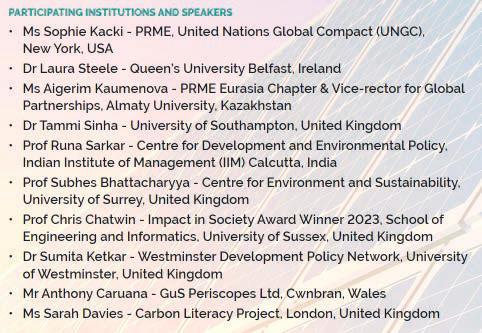
The University of Winchester achieved a Gold Mark from the Social Enterprise Mark CIC which is the authority that provides certification to businesses to prove they operate as a social enterprise, putting people before shareholder profit. As a values-led university, Winchester is closely aligned to the Social Enterprise Gold Mark priorities.

PRINCIPLES FOR RESPONSIBLE MANAGEMENT EDUCATION 2022 66
EXTERNAL SPEAKERS AT THE SYMPOSIUM INCLUDED:
WESTMINSTER DEVELOPMENT POLICY NETWORK
Dr Boidurjo Rick Mukhopadhyay, PRME Champion at the University of Winchester is a Fellow at the Westminster Development Policy Network and chaired the panel on “What are the challenges in reducing the gender employment gap? An institutional and governmental perspective” with Dr Erendira Leon Bravo (University of Westminster), Dr Sanchari Roy (King’s College London), and Dr Gary Slater (University of Leeds) at the annual Symposium in 2022.
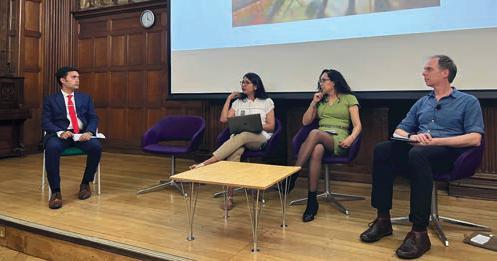
FLOURISHING COMMUNITIES
One of the three pillars of Winchester’s Strategic Vision 2030 is Flourishing People and Communities. This pillar captures the institution’s commitment to support students and staff to flourish and inspire them to use their energy and skills to contribute to flourishing local and global communities. Working with the local community, Winchester has developed a shared vision with seven features of what a flourishing community looks like.
After further community consultation, the group also developed a Flourishing Communities Framework, in which three founding principles are articulated (start together, start by listening and start with values) and three actions (model change, support change and make change). Winchester will support this shared vision and work towards its achievement.
ENVIRONMENTAL ASSOCIATION FOR UNIVERSITIES AND COLLEGES (EAUC)
Winchester are active members of EAUC, participating in their National and International Green Gown Awards, the SDG Accord and The Sustainability Leadership Scorecard. The Accord aims to inspire, celebrate and advance the critical role that education has in delivering the SDGs. Whilst the Scorecard provides an indicator of performance and highlights any gaps to work on.


www.sdgaccord.org www.eauc.org.uk/ sustainability_leadership_scorecard
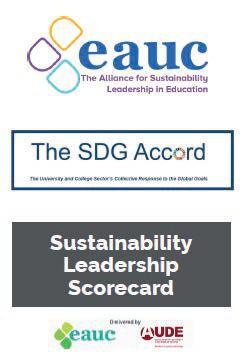

PRINCIPLES FOR RESPONSIBLE MANAGEMENT EDUCATION 2022 67

68 PRINCIPLES FOR RESPONSIBLE MANAGEMENT EDUCATION 2022
PLANS FOR THE NEXT YEAR
Key objectives for 2023-2024:
• To enhance and consolidate student engagement with PRME by undertaking a number of substantial revisions to our postgraduate research offering, ensuring the principles are embedded in the design of a new MRes degree and reiterated throughout an enhanced PhD programme.
• To continue developing our expertise in core PRME research subjects and generating knowledge for the creation of sustainable social, environmental and economic value; this would include running our annual international PRME symposium, summer programme, and introducing a ‘PRME world classroom’ in association with international PRME chapters and wider networks.
SUMMER SCHOOL ON PRME TO BE OFFERED TWICE EVERY YEAR
‘Responsible Leadership and Sustainable Management Practices’ by Dr Boidurjo Rick Mukhopadhyay
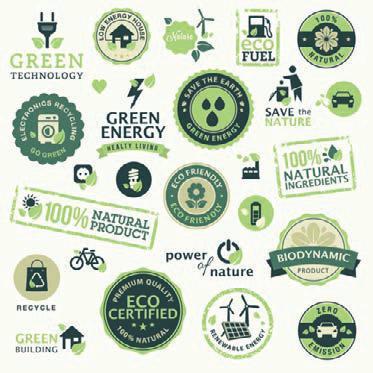
Programme description: Organisations are under increasing pressure from various stakeholders to embed environmental and social purpose into business systems and structures, this programme is designed to develop understanding of opportunities and challenges for progressive and transformative organisational action for responsible leaders of tomorrow. This programme provides student with a conceptual and practical understanding of the principles of responsible management as presented in the United Nations PRME, Global Compact frameworks, and SDGs.
Emphasis is given to the business perspective (both from an individual and organisational analytical lens), alongside other societal actors in a broader political economic context, alongside ethical decisions shaping responsible business management practices.
PRME INTERNATIONAL SYMPOSIUM 2023-24
Following the symposium held in 22/23, the event will be hosted annually by the University of Winchester Business School bringing together UK and non-UK PRME chapters and networks, along with eminent social scientists and business leaders engaged with SDGs.
Programme details here - https://issuu.com/theuniversityofwinchester/docs/prme_ programme_2023?fr=sZjNlYTYwMTE4MjM
PRINCIPLES FOR RESPONSIBLE MANAGEMENT EDUCATION 2022 69
WINCHESTER BUSINESS SCHOOL PROJECT ON “IMPACTFUL FIVE (I5): LEARNING IN LEADERSHIP EDUCATION” USING AN INTERNATIONAL AND MULTI-STAKEHOLDER PERSPECTIVE.

The PRME ‘Impactful Five’ (i5) is a three-year UNGC program that focuses on developing pedagogical approaches for making sustainable development the norm for responsible management education and leadership in business education. The model fundamentally aims to combine the cognitive skill set training with ‘playful learning’ to integrate collaborative, social, meaningful, joyful, iterative, and actively engaging methods to train responsible leaders for tomorrow. The standard model, introduced jointly by the UNGC and PRME in 2023, requires pedagogical adoption of playful learning for holistic development among the PRME members; however, the novelty of this proposed project at the University of Winchester introduces collaboration with 2 UK, 2 international PRME champions, and 2 Winchester-based green businesses in pioneering to create a bespoke i5 model with a particular focus on responsible management and leadership whereby a benchmarking scorecard for i5 adoption in business school (both within the PRME network and beyond) will be developed.
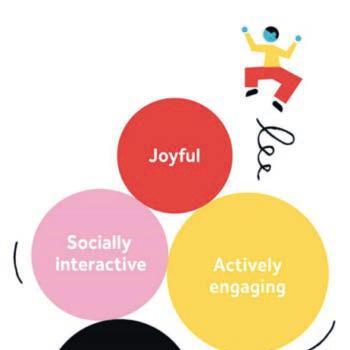
PRINCIPLES FOR RESPONSIBLE MANAGEMENT EDUCATION 2022 70
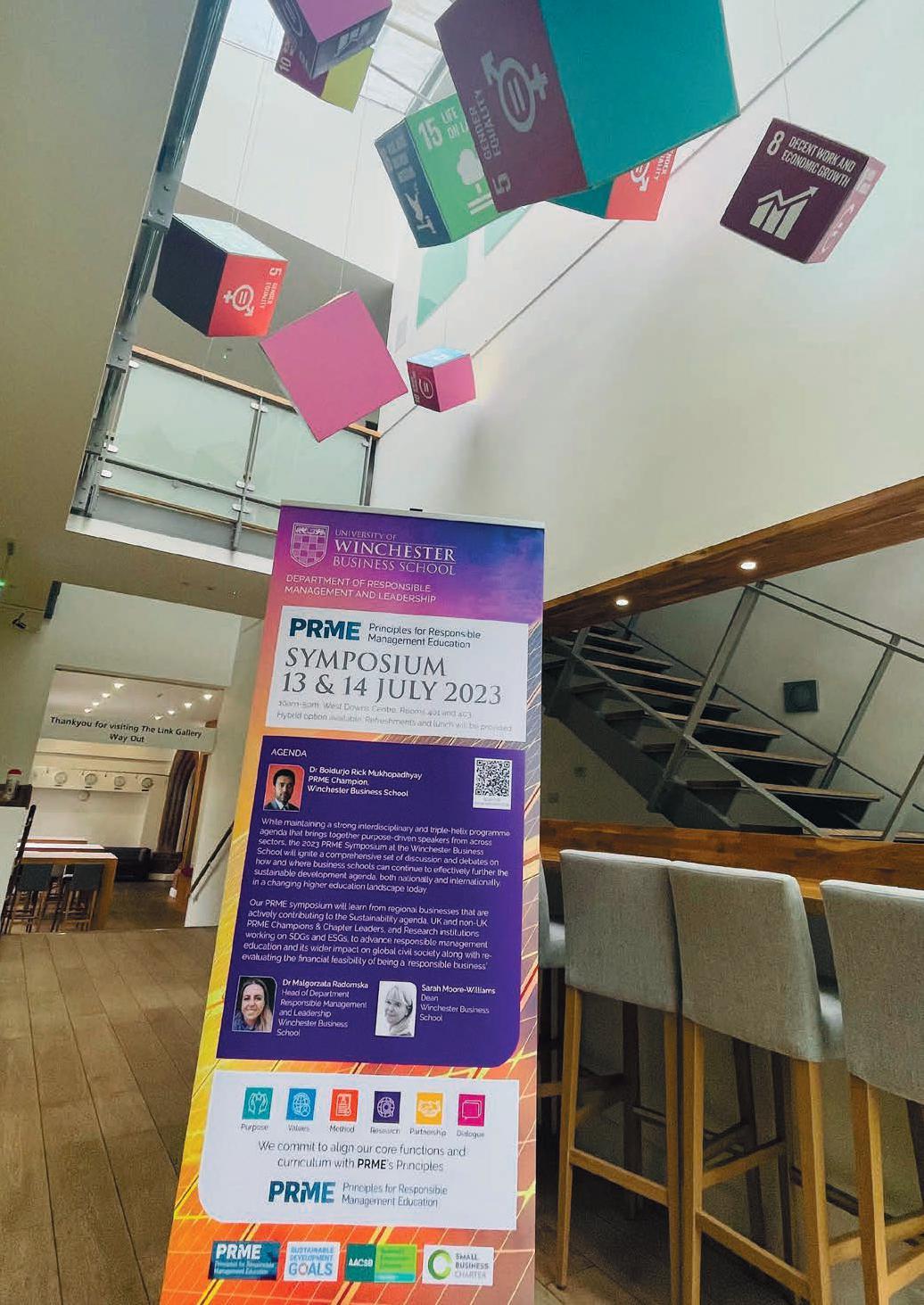
71 PRINCIPLES FOR RESPONSIBLE MANAGEMENT EDUCATION 2022




